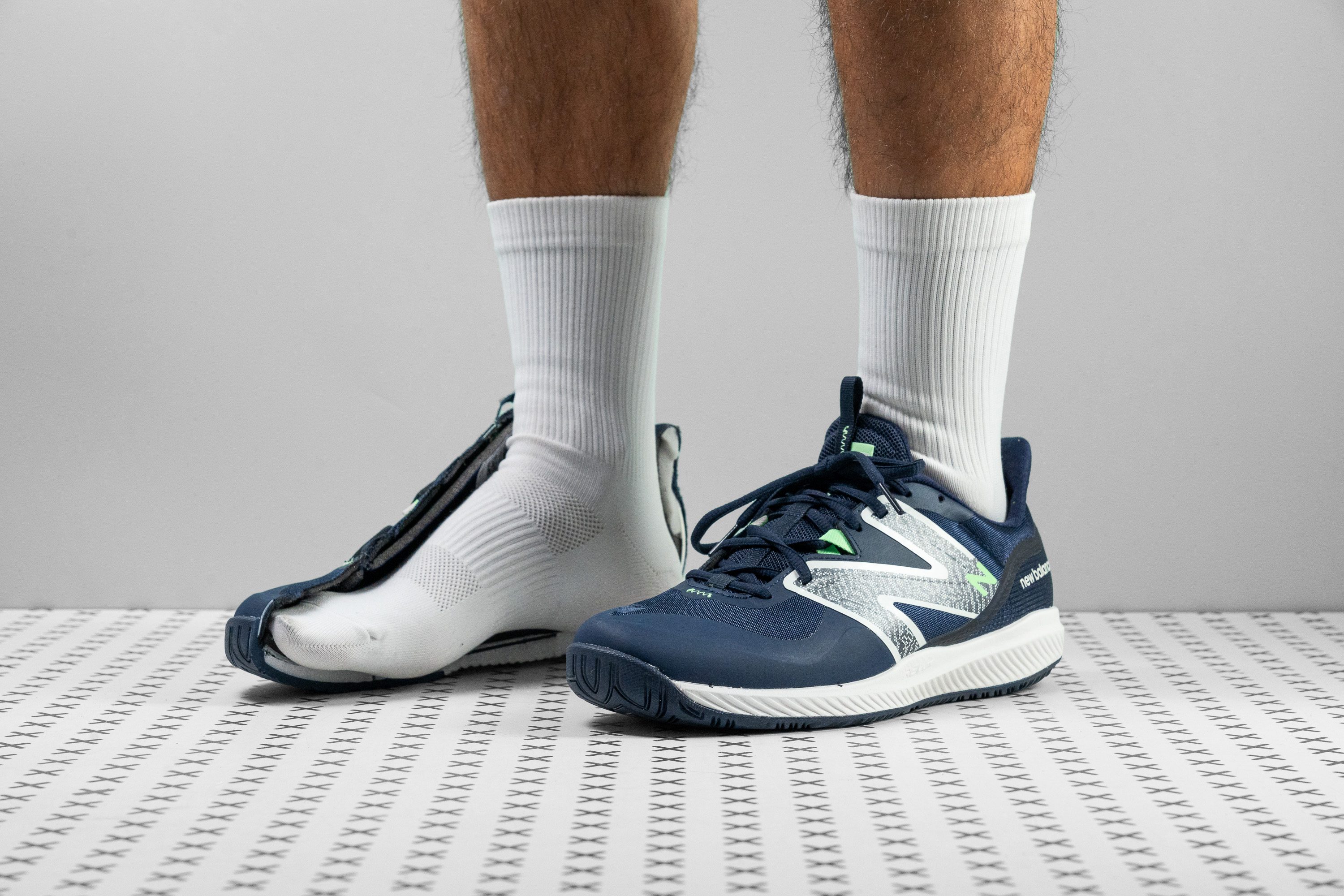Our verdict
- Top pick in best cheap tennis shoes (2023)
Pros
- Exceptionally lightweight
- Unexpectedly hard-wearing outsole
- Very sensitive court feel
- Decent support given the shoe's design
- Allows trouble-free movement changes
- Grips well when you need it
- Super affordable price
- Zero break-in
Cons
- Not very breathable
- Thin and firm cushioning
- Not the most stable and supportive
Audience verdict
- Top 29% in New Balance tennis shoes
Comparison
The most similar tennis shoes compared
+ + Add a shoe | |||||
|---|---|---|---|---|---|
| Audience score | 80 Good! | 65 Bad! | 88 Great! | 78 Good! | |
| Price | £100 | £90 | £120 | £65 | |
| Shoe type | Hard Court | All Court | All CourtHard Court | All CourtHard Court | |
| Shock absorption | - | - | Low | Low | |
| Energy return | - | - | Moderate | Moderate | |
| Traction | - | - | Low | High | |
| Construction | Speed | Stability | Speed | Stability | |
| Breathability | Moderate | Warm | Breathable | Breathable | |
| Weight lab | 10.3 oz / 292g | 12.2 oz / 346g | 12.1 oz / 343g | 11.3 oz / 319g | |
| Lightweight | ✓ | ✓ | ✓ | ✓ | |
| Drop lab | 7.9 mm | 7.5 mm | 8.8 mm | 10.2 mm | |
| Width / fit | Medium | Medium | Medium | Medium | |
| Toebox width | Medium | Medium | Medium | Medium | |
| Size | - | Half size small | True to size | Slightly small | |
| Midsole softness | Balanced | Balanced | Firm | Balanced | |
| Stiffness | Stiff | Stiff | Moderate | Flexible | |
| Torsional rigidity | Moderate | Moderate | Flexible | Moderate | |
| Heel counter stiffness | Flexible | Stiff | Moderate | Flexible | |
| Midsole width - forefoot | Average | Wide | Average | Narrow | |
| Midsole width - heel | Very narrow | Average | Narrow | Narrow | |
| Outsole durability | Good | Bad | - | Decent | |
| Heel padding durability | Good | Bad | - | Bad | |
| Heel stack lab | 25.3 mm | 28.4 mm | 26.4 mm | 28.6 mm | |
| Forefoot | 17.4 mm | 20.9 mm | 17.6 mm | 18.4 mm | |
| Insole thickness | Thin | Average | Average | Average | |
| Removable insole | ✓ | ✓ | ✓ | ✓ | |
| Heel tab | None | None | None | None | |
| Toebox durability | Decent | Decent | - | Bad | |
| Outsole hardness | Hard | Average | Average | Average | |
| Outsole thickness | Average | Very thick | Average | Average | |
| Ranking | #43 Bottom 18% | #41 Bottom 2% | #9 Top 22% | #35 Bottom 16% | |
| Popularity | #51 Bottom 3% | #40 Bottom 4% | #26 Bottom 38% | #16 Top 39% |
Who should buy
We didn't expect much from the New Balance 796 v3 but boy did the shoe impress us. We can wholeheartedly recommend it to tennis players who:
- are just starting out with the sport
- don't want to spend a lot of money on tennis shoes but want a decent pair
- prefer very lightweight shoes that help them stay nimble
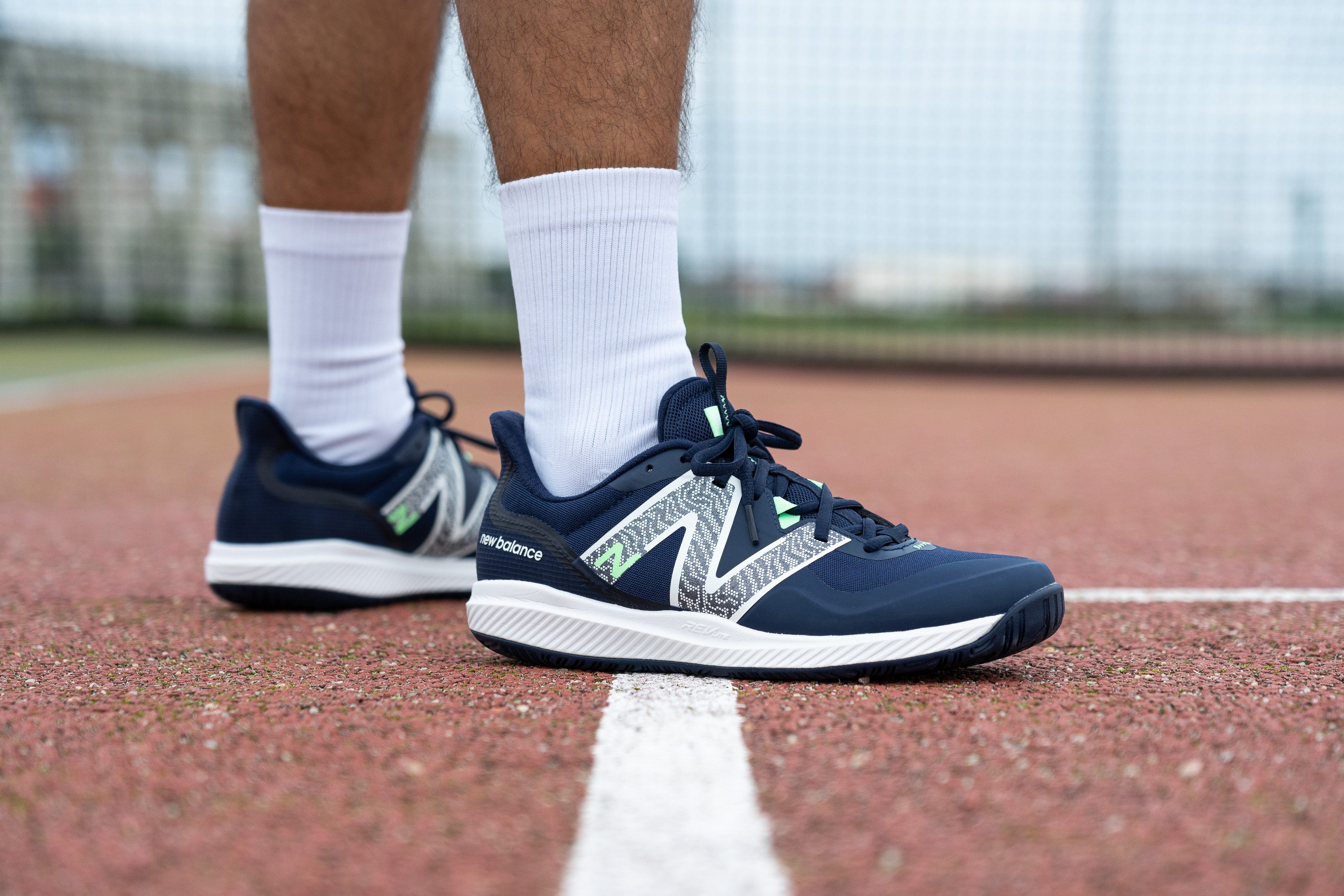
Who should NOT buy
For the retail price of only £90, this New Balance shoe is a steal, for sure. But just like any cheap shoe, the 796 v5 makes compromises to meet such a low price point. The most crucial ones are cushioning and stability.
If you are willing to extend your tennis shoe budget by another £10-20, we believe that the K-Swiss Hypercourt Express 2 and the ASICS Gel Challenger 14 would fill in the gaps of the 796 v5.
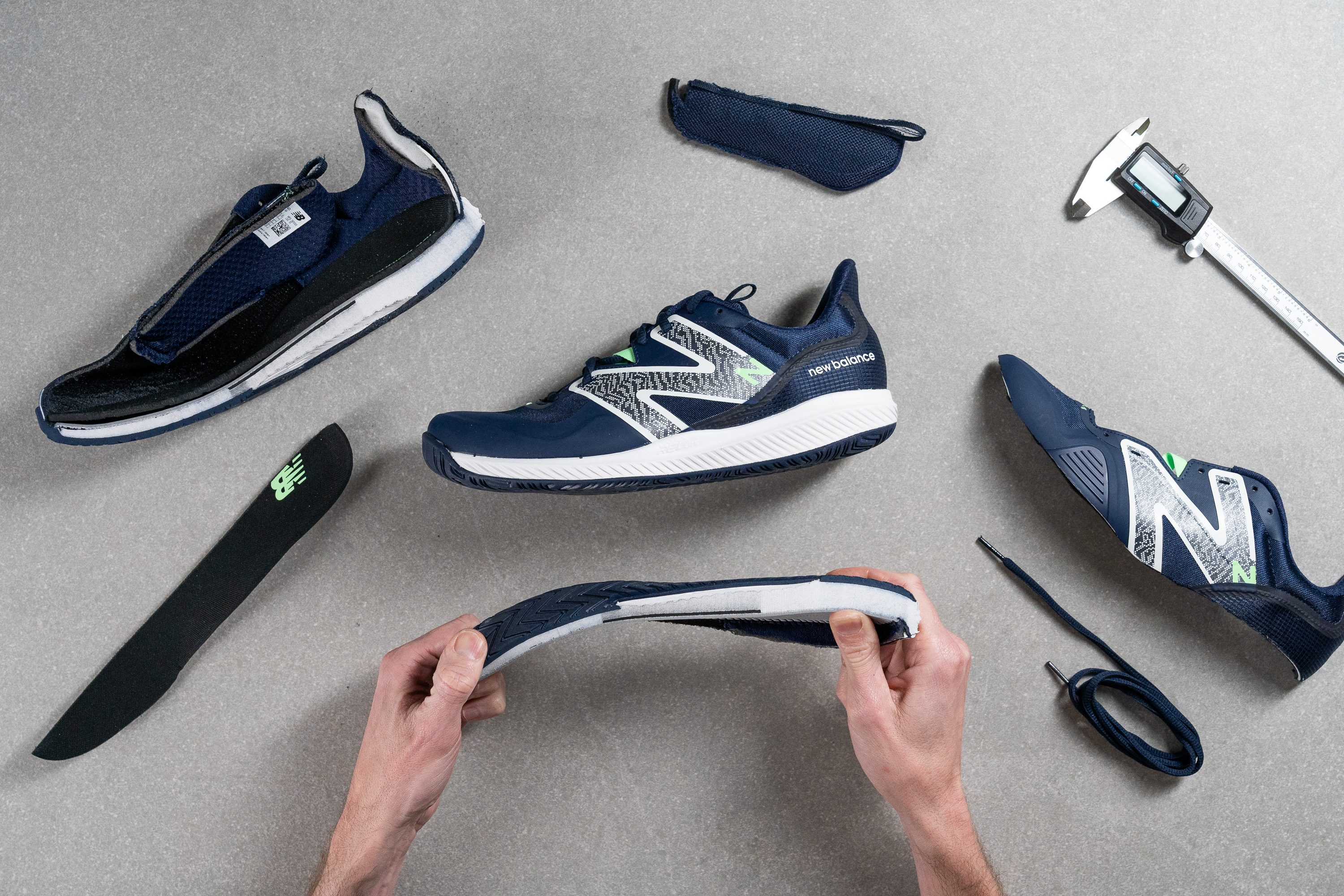
Cushioning
Heel stack
It is enough to just look at the 795 v5 to understand that it's not very abundant with cushioning. Light and grounded, it made the court feel very close to the bottoms of our feet. While the impact protection was present, it certainly wasn't the best for super hard landings.
Based on our calliper measurements, the heel stack of his NB shoe turned out to be as small as 25.3 mm. That is also the lowest heel height among our lab-tested tennis shoes.
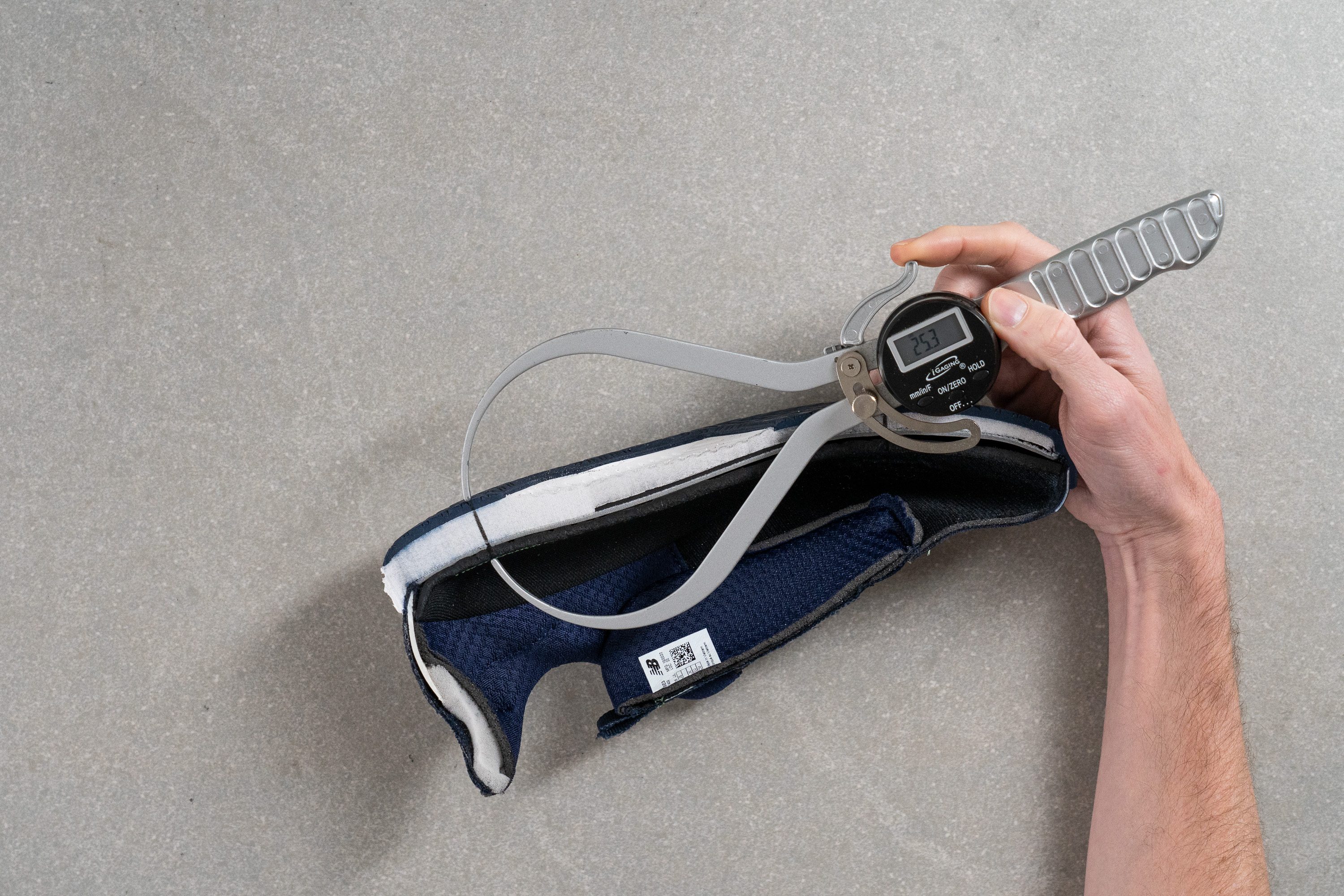
| 796 v3 | 25.3 mm |
| Average | 29.2 mm |
Forefoot stack
The shoe's midsole gets even closer to the ground under the balls of our feet. With a forefoot stack of only 17.4 mm, this NB shoe made us feel almost barefoot on the court.
But we found it to be a positive thing helping us get out of our own way for very quick footwork.
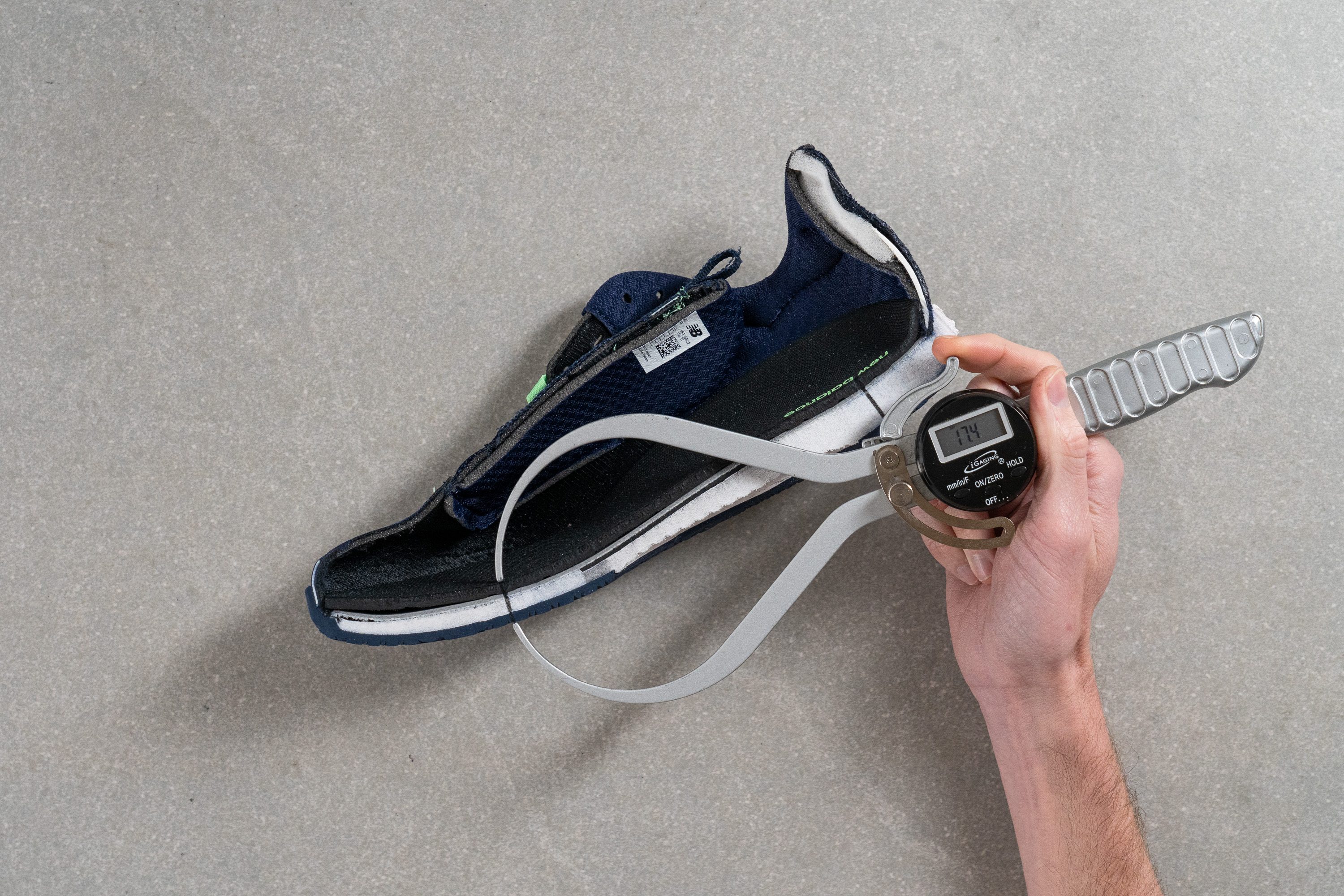
| 796 v3 | 17.4 mm |
| Average | 19.3 mm |
Drop
Another characteristic that makes the 796 v5 feel so intimately connected to the court is its lower-than-average heel-to-toe drop. At only 7.9 mm, it is a few millimetres lower than in many popular tennis shoes which might feel weird at first.
But the benefit of this setup lies in its excellent responsiveness to the player's movements. There is no delayed response and transitions in between shots felt seamless.
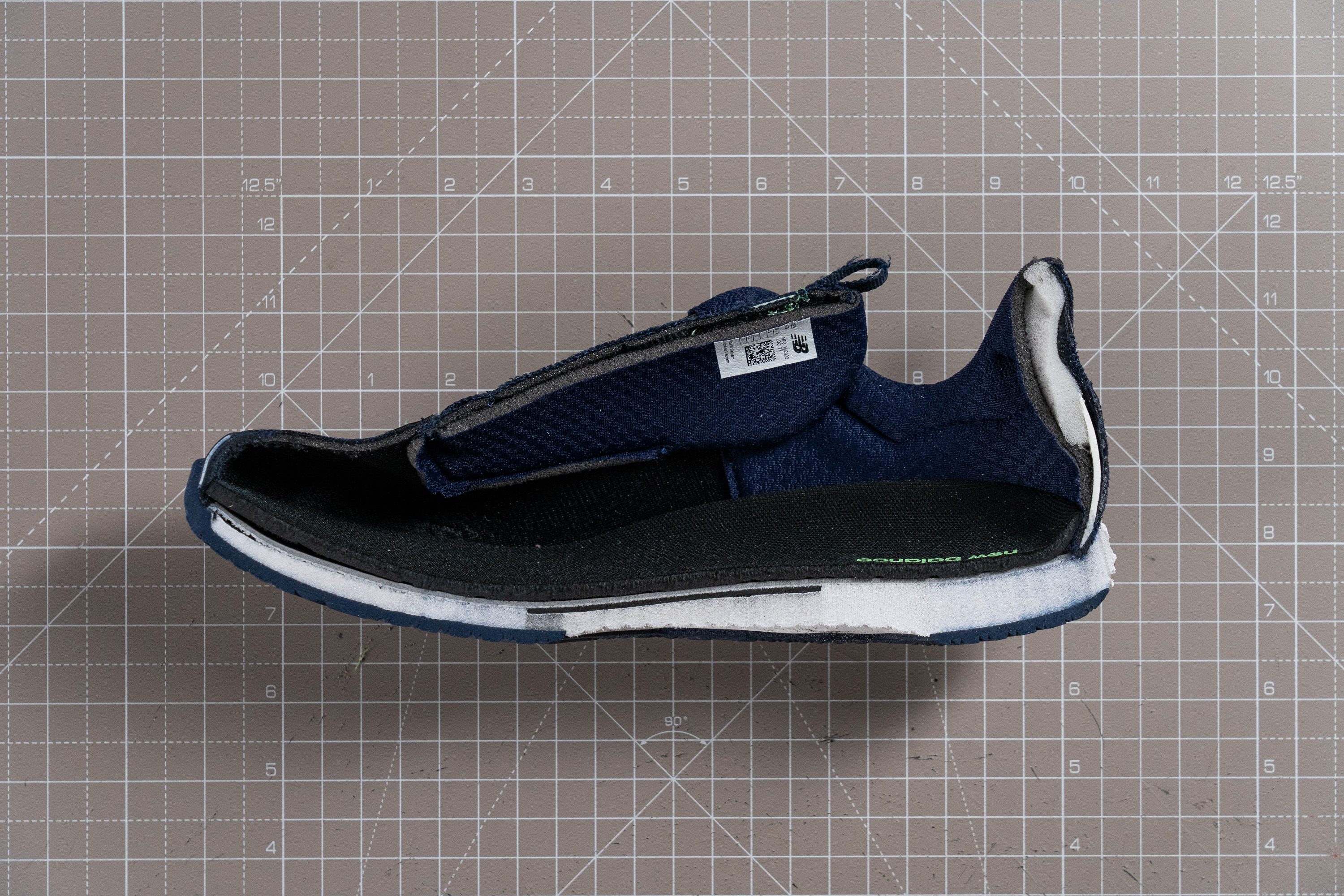
| 796 v3 | 7.9 mm |
| Average | 9.9 mm |
Midsole softness
We didn't feel much softness in the cushioning of the NB 796 v5 either. Featuring the REVlite foam, New Balance prioritises lightness and grounded geel in this tennis shoe.
Pressing our durometer against the foam returned 30.0 HA. It's not firmer than the average tennis shoe but given how quickly it bottoms out, it's not long before the shoe feels flat and dead.
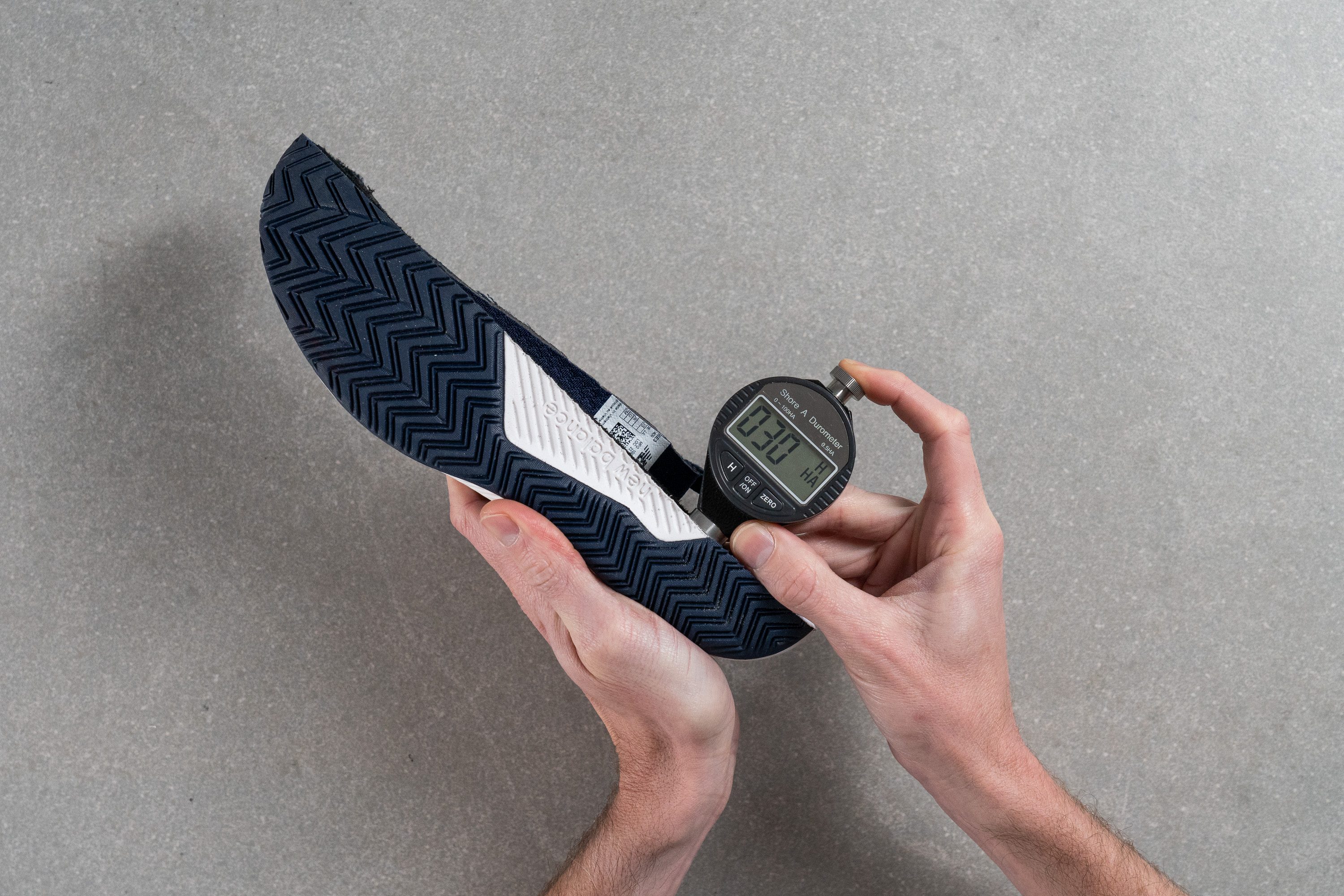
| 796 v3 | 30.0 HA |
| Average | 28.1 HA |
Size and fit
Size
Internal length
| 796 v3 | 265.9 mm |
| Average | 271.2 mm |
Width / Fit
The fit of this New Balance shoe felt slightly on the tight side for our medium-width feet. While it never got to the point of pinching, we strongly recommend getting the wide version of the 796 v5 if you have wide feet or bunions.
In the widest part of the forefoot, our calliper measured 99.2 mm which is a tiny bit narrower than the average.
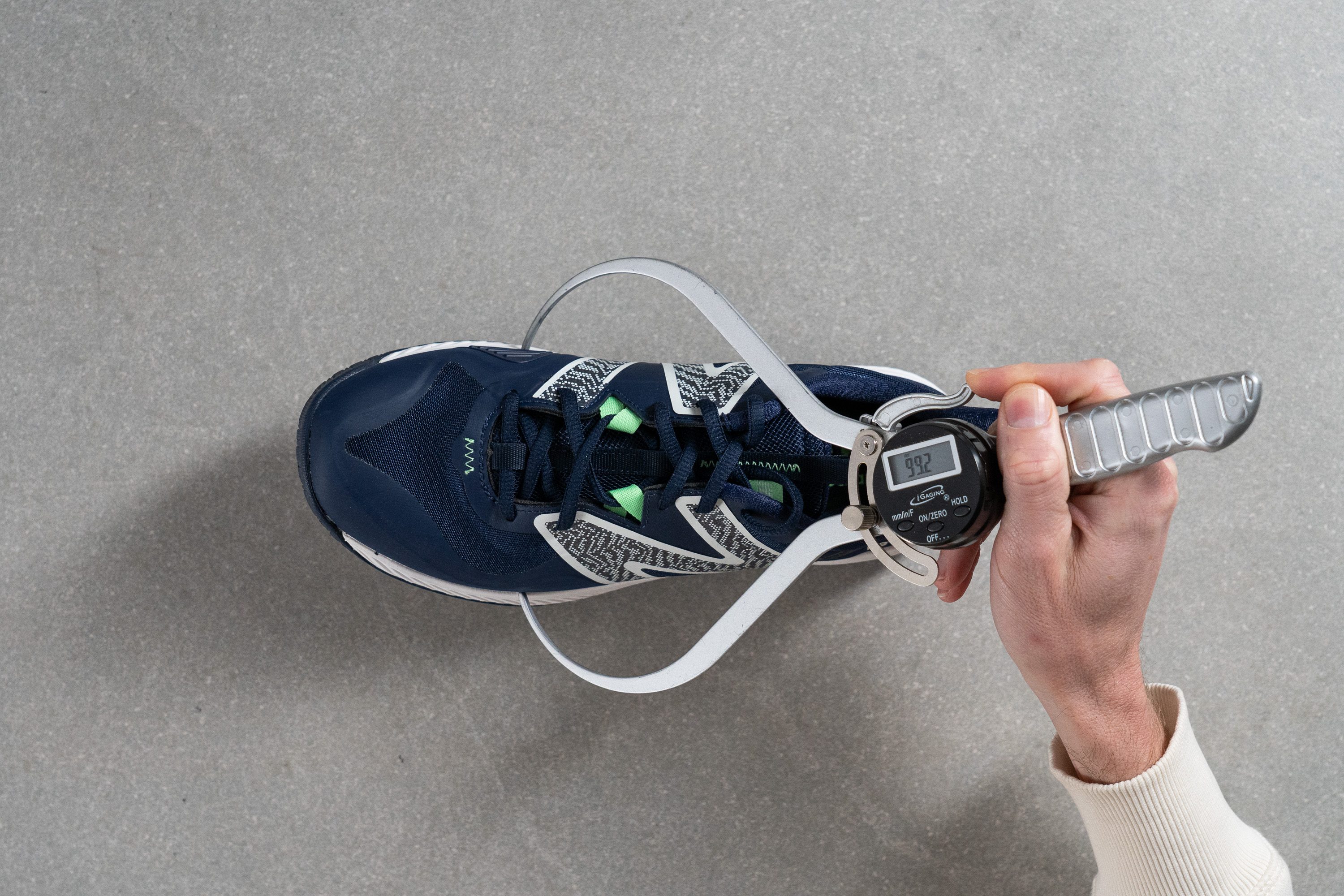
This test follows an older methodology, which is why you don't see recently tested shoes in the chart. Results from different methodologies can not be compared.
| 796 v3 | 99.2 mm |
| Average | 101.0 mm |
Toebox width
As for the tip of the toebox, luckily it doesn't get narrower than average. Measuring it at the big toe mark, our calliper recorded 77.2 mm which is a standard width.
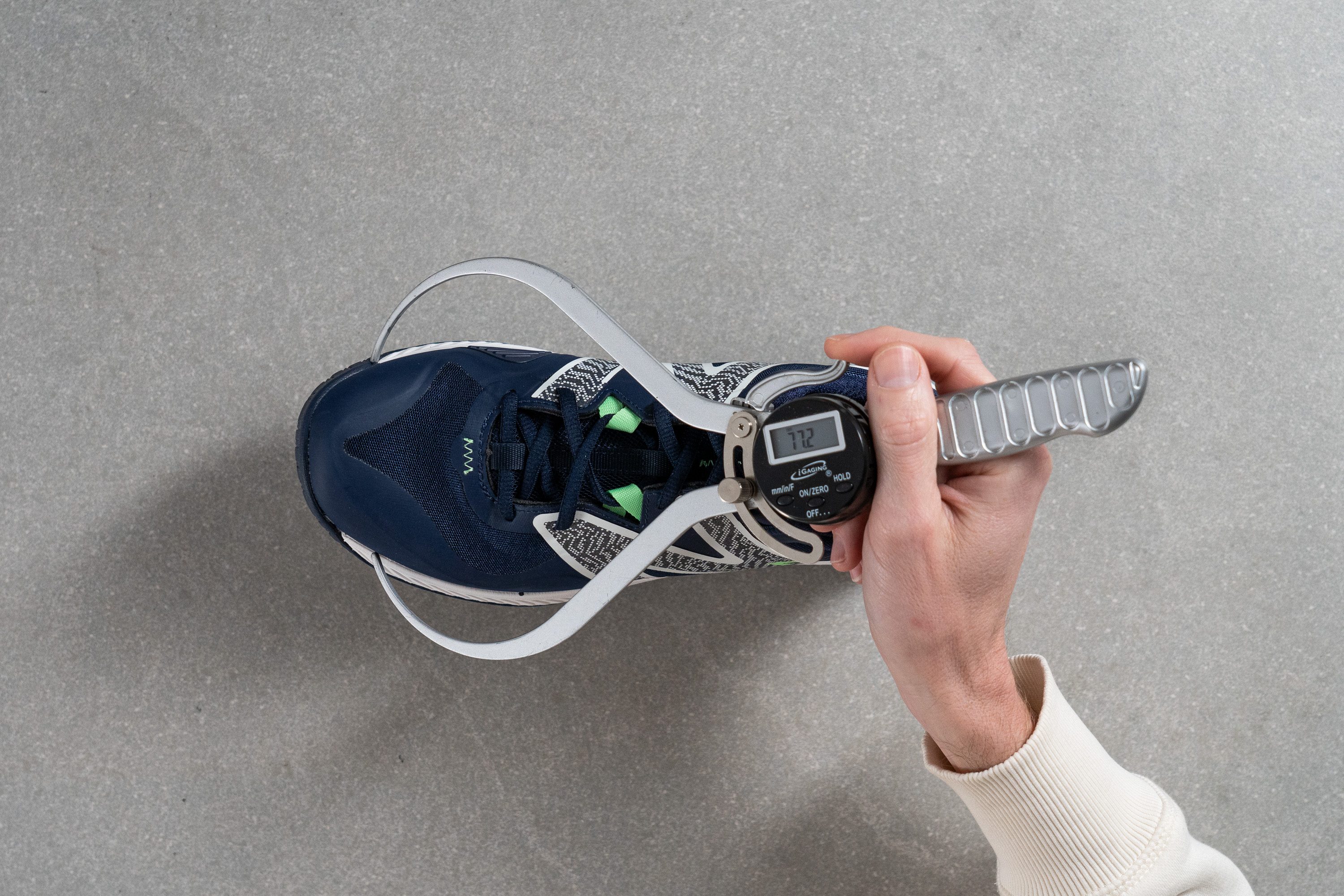
This test follows an older methodology, which is why you don't see recently tested shoes in the chart. Results from different methodologies can not be compared.
| 796 v3 | 77.2 mm |
| Average | 76.9 mm |
Flexibility / Stiffness
The New Balance 796 v5 doesn't have any substantial stability elements but it still ends up stiffer than most tennis shoes! Bending the foot, we could feel a bit more resistance in the sole. But the bright side of it is that it added a little pop upon take-offs.
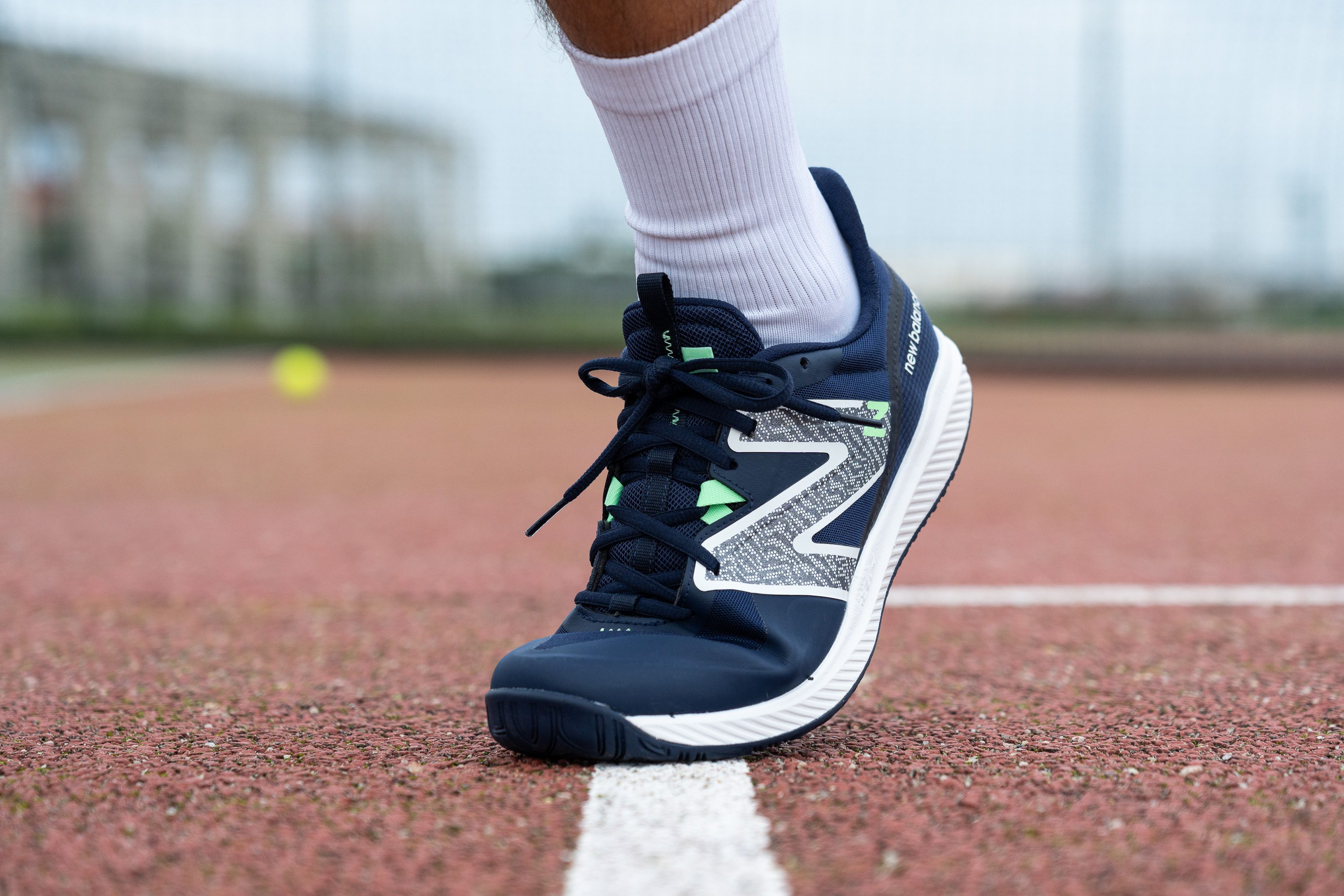
To provide more specific facts, we measured how much force it would take to bend the NB 796 v5 to a 90-degree angle. Based on our force gauge, it requires 33.5N which is 12% more than average.
This test follows an older methodology, which is why you don't see recently tested shoes in the chart. Results from different methodologies can not be compared.
| 796 v3 | 33.5N |
| Average | 30.7N |
Weight
The New Balance 796 v5 is the lightest tennis shoe we've recorded in our lab by far! More than 2 ounces lighter than average, it is barely even felt on the foot.
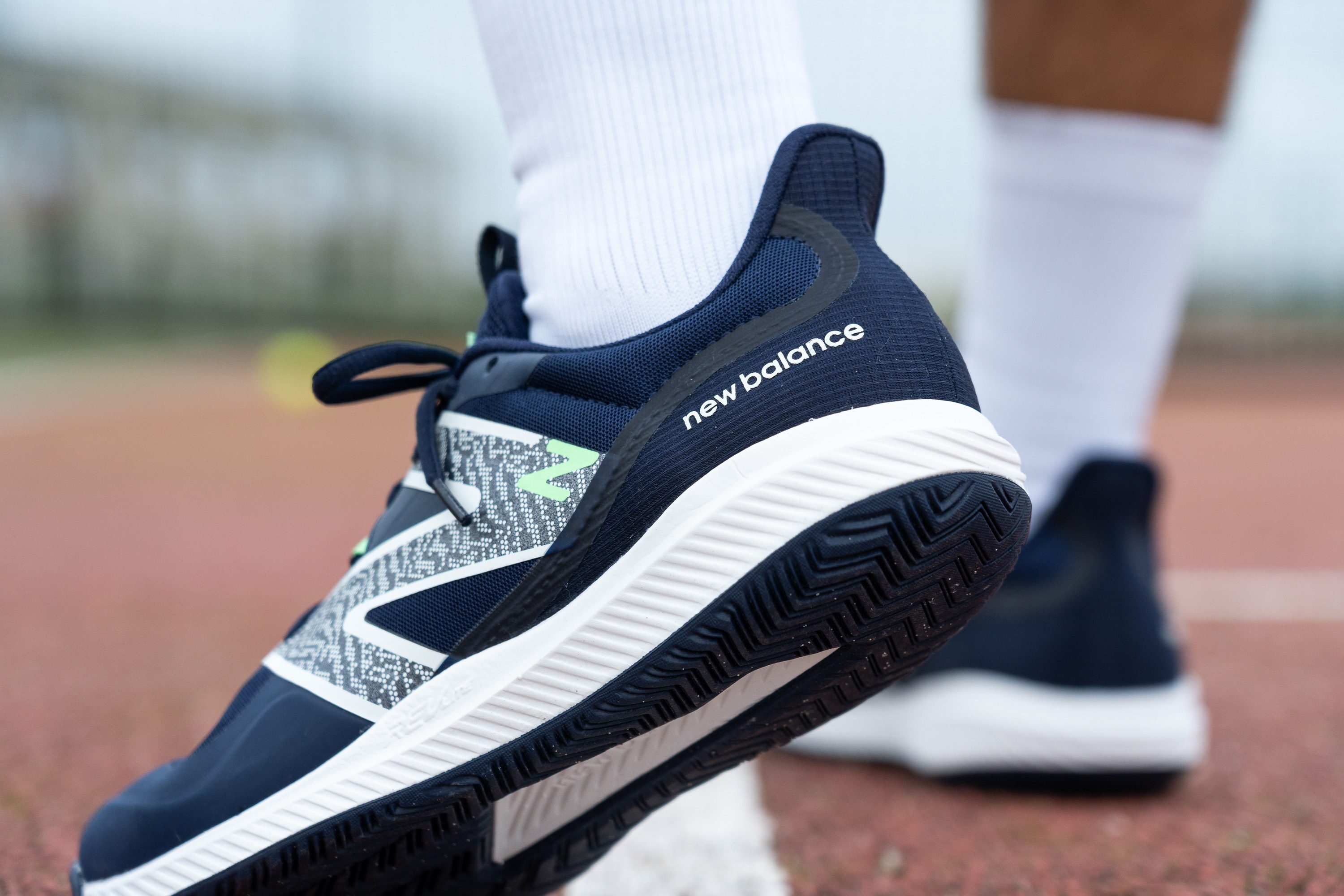
In a men's US size 9, it tips the scale at only 10.3 oz (292g). Truly impressive for a tennis shoe, especially stepping out of the regular 13.5-14-ounce shoes.
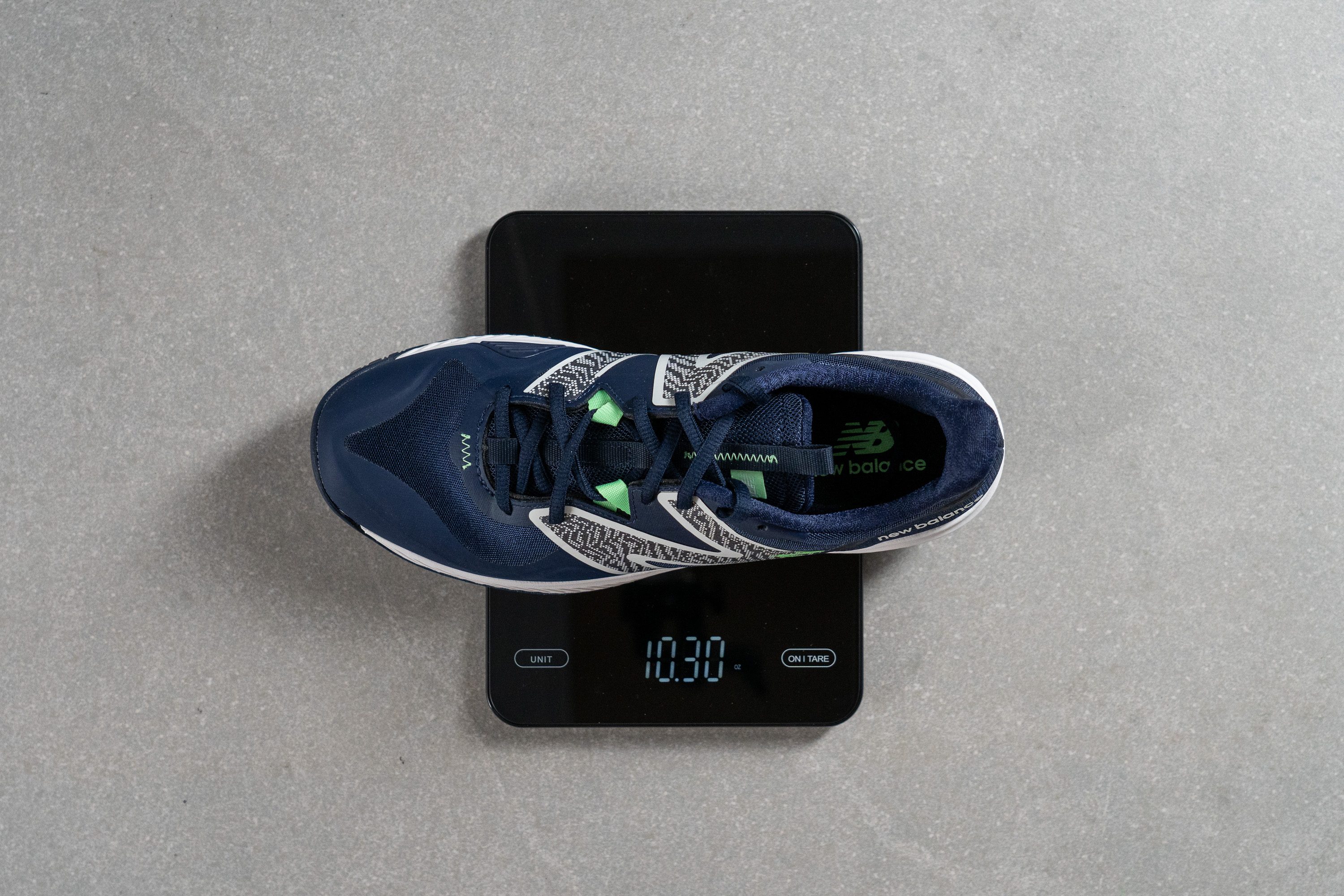
| 796 v3 | 10.3 oz (292g) |
| Average | 12.8 oz (364g) |
Breathability
It is so rare to come across a breathable tennis shoe these days...Unfortunately, the NB 796 v5 did not make an exception. Even though it doesn't have any dense PU overlays on the upper, its fabric failed to keep our feet sufficiently ventilated on the court.
In our smoke-pumping breathability test below, you can see how none of the smoke is coming through the toebox and very little is getting out of the tongue.
Because of such modest smoke expulsion, we subtracted points from the shoe's breathability score leaving it with only 3 out of 5. That is slightly less breathable than tennis shoes on average.
Even when we hovered the shoe's half-cut upper over the light, it proved to be very densely woven.
Grabbing our microscope, we also took a closer look at the toebox fabric.
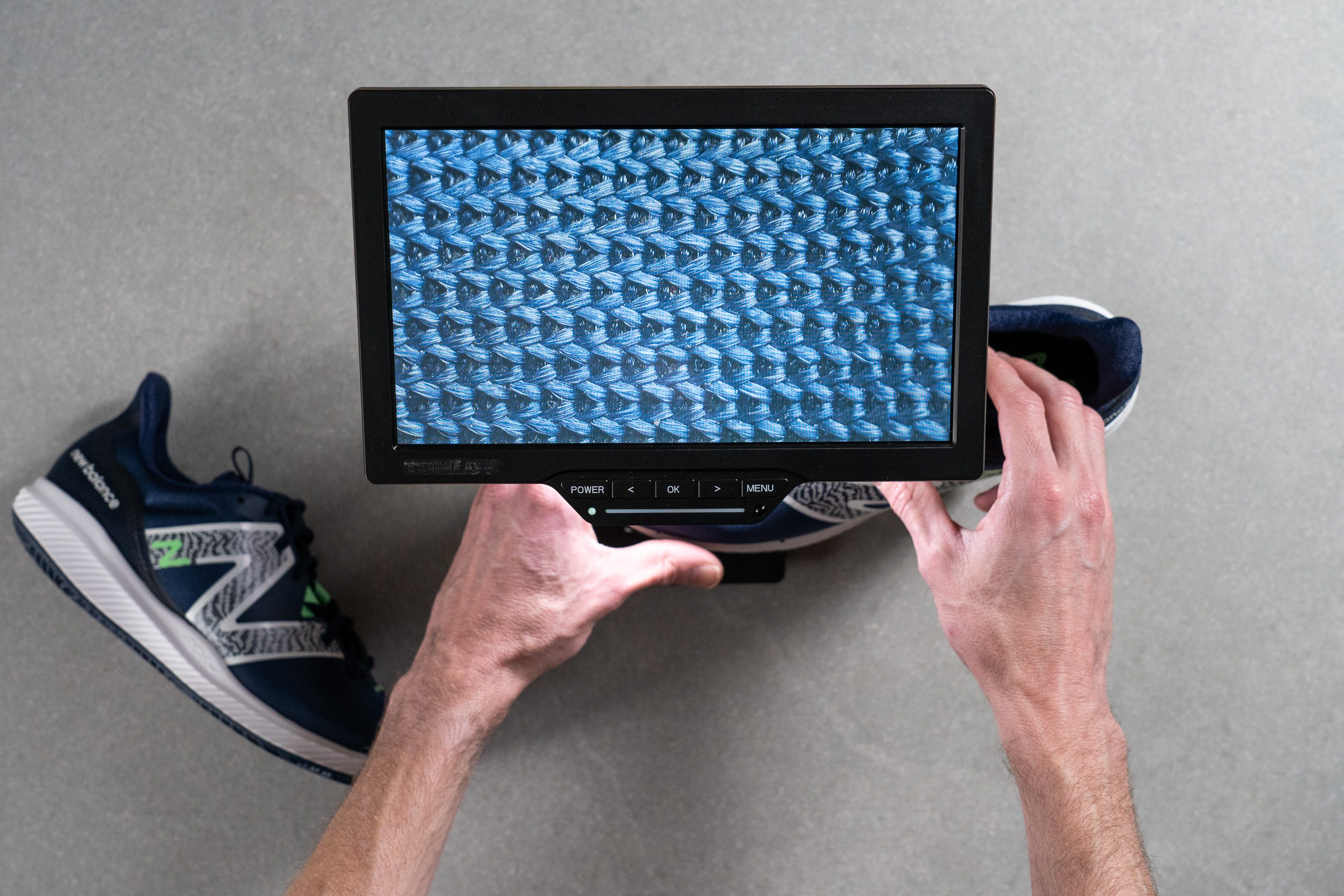
The chainlinks here are so small and so tightly knit together that we cannot possibly imagine the heat escaping through them.
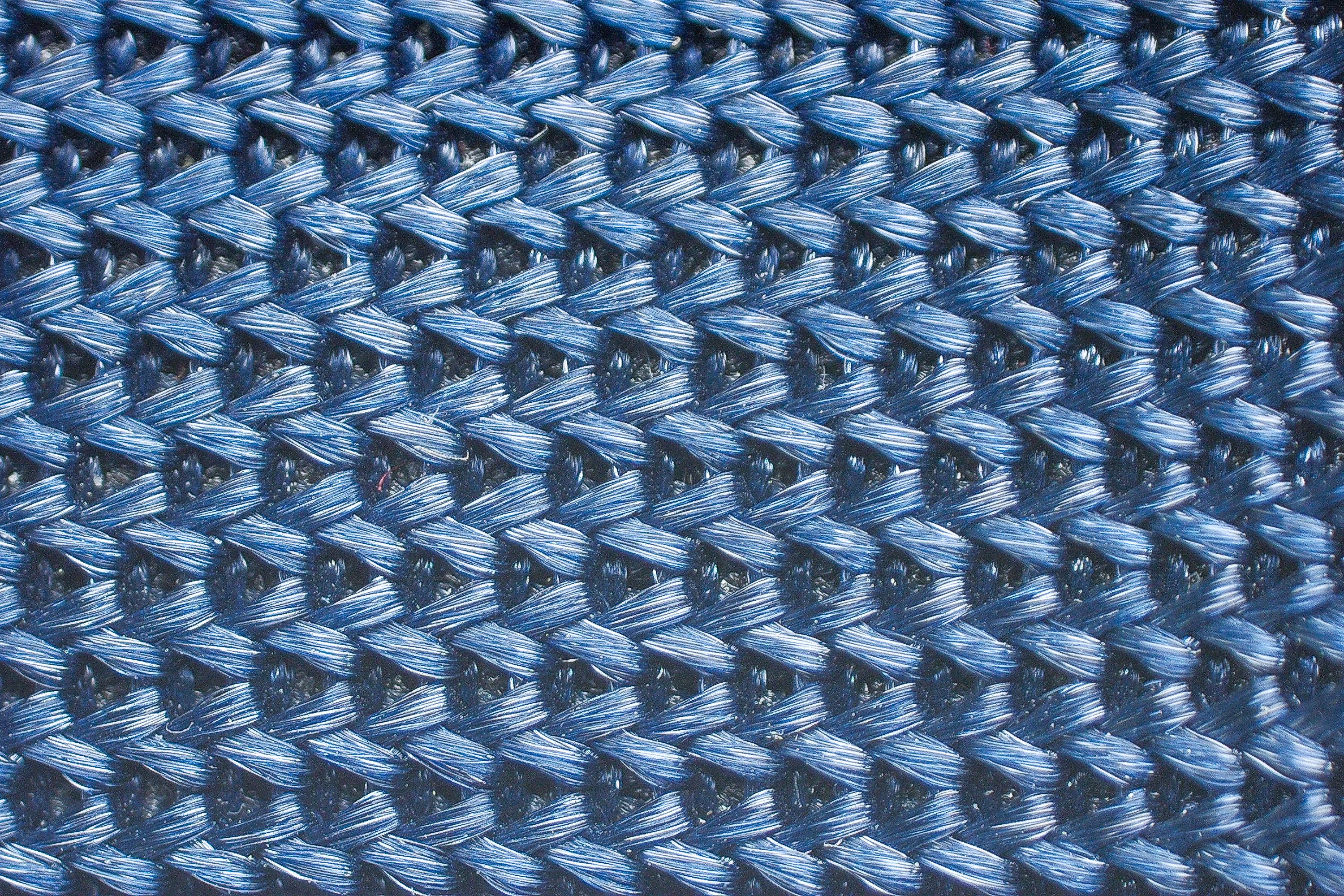
| 796 v3 | 3 |
| Average | 3.1 |
Stability
Lateral stability test
Testing the shoe's ability to support aggressive lateral movements, crossover steps, and forceful push-offs, we found the 796 v5 quite decent in that regard.
Sure, it could never compete with the big boys like the ASICS Gel Resolution 9 or the Adidas Barricade 13 but it was never meant to.
If you are someone with severely flat and overpronated feet or you have other foot conditions that require solid arch support, we recommend looking into the ASICS Gel Challenger 14.
Torsional rigidity
Unlike other tennis shoes with huge barricades in the midfoot (pun intended), the New Balance 796 v5 went for a small and cute TPU shank inside the midsole.
But even though it doesn't extend full-length or wrap around the sides of the shoe, it adds a good amount of torsional rigidity to this NB shoe. On a stiffness scale from 1 to 5, we gave it a high score of 4 in our manual test. While it doesn't eliminate the risk of ankle-rolling, it offers ample support for most scenarios.
| 796 v3 | 4 |
| Average | 4.5 |
Heel counter stiffness
Getting our hands on the shoe's heel counter, we felt that it was stiff at the base but got more pliable towards the collar. To us, this combination felt like a moderate 3 out of 5 score for heel counter stiffness.
On the court, the shoe offered a pretty secure heel hold with no hints of heel slippage. But where it did fall short was the lack of ankle support on the side.
| 796 v3 | 3 |
| Average | 4.1 |
Midsole width - forefoot
The platform of the New Balance 796 v5 happens to be narrower than average too. In the forefoot, we could barely even see the lateral flange.
As our calliper shows, the widest part of the forefoot comes in at an adequate 110.6 mm. But we think that it wouldn't hurt to extend it slightly wider to compensate for the lack of arch support in the midfoot.
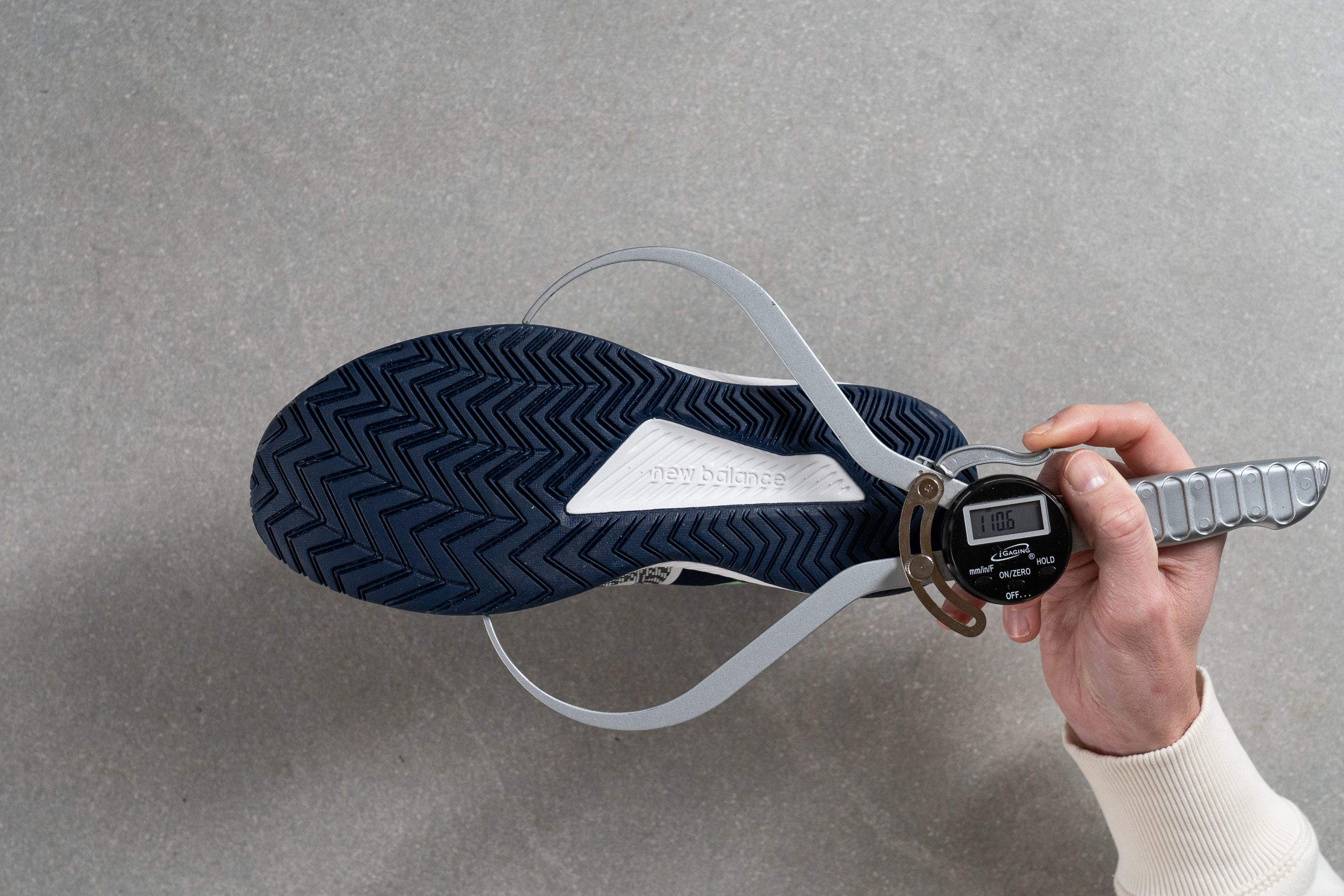
| 796 v3 | 110.6 mm |
| Average | 112.0 mm |
Midsole width - heel
As for the heel, it turns out to be notably narrower than average at 83.2 mm. Actually, it is significantly narrower than average, by more than 5 mm!
Sure, it didn't make us feel tippy at all times but there were moments when we just felt a bit on the edge.
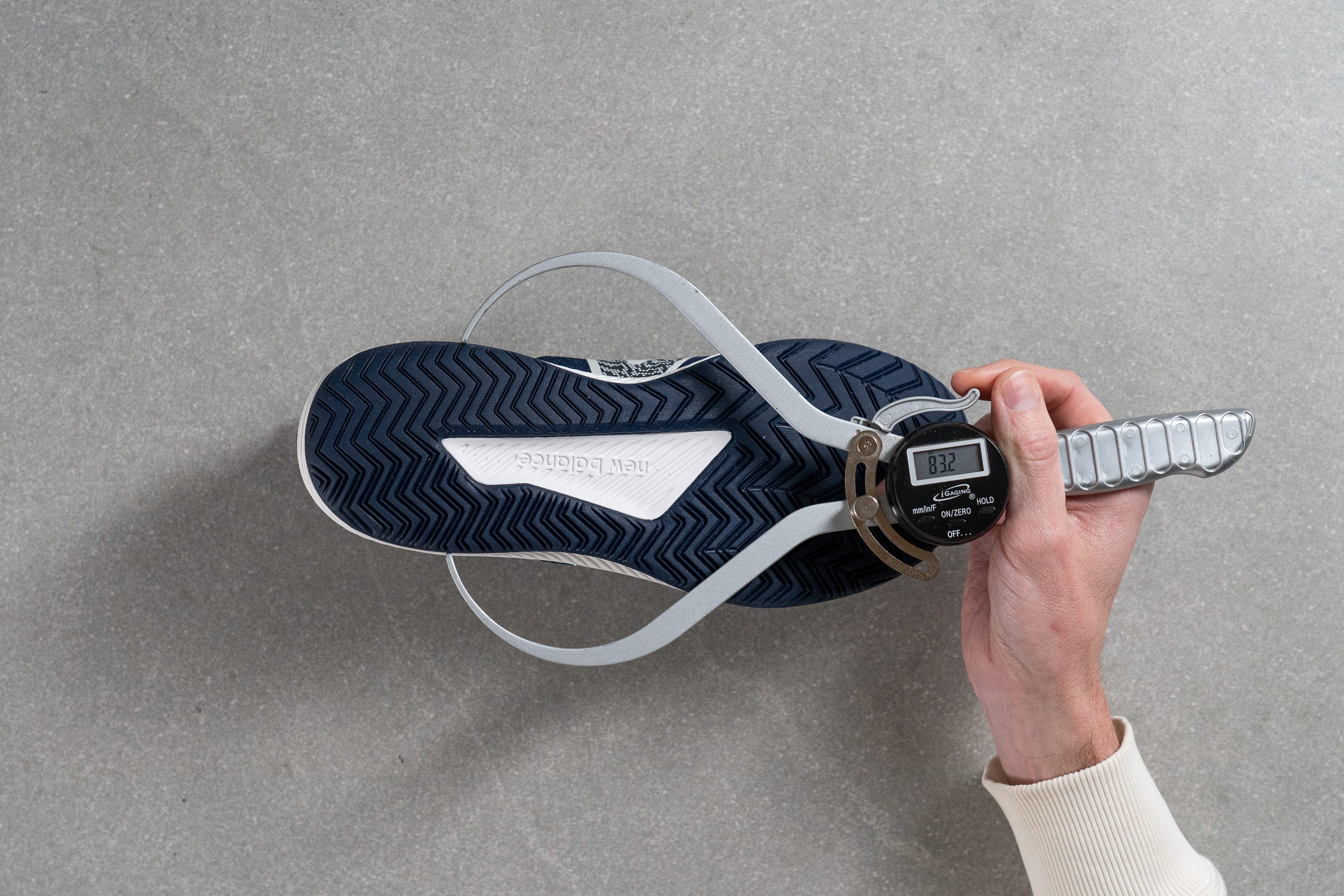
| 796 v3 | 83.2 mm |
| Average | 89.8 mm |
Durability
Toebox durability
When you're testing a shoe whose price point is £40 lower than average, you don't really anticipate mind-blowing durability. But we must also say that this New Balance shoe didn't leave us disappointed either.
Equipped with a Dremel, we test all of our tennis shoes in the same conditions for consistent results. The tool's speed is set to 5K RPM as we apply its sandpaper tip to the shoe's toebox for 12 seconds with a light 3.2N pressure.
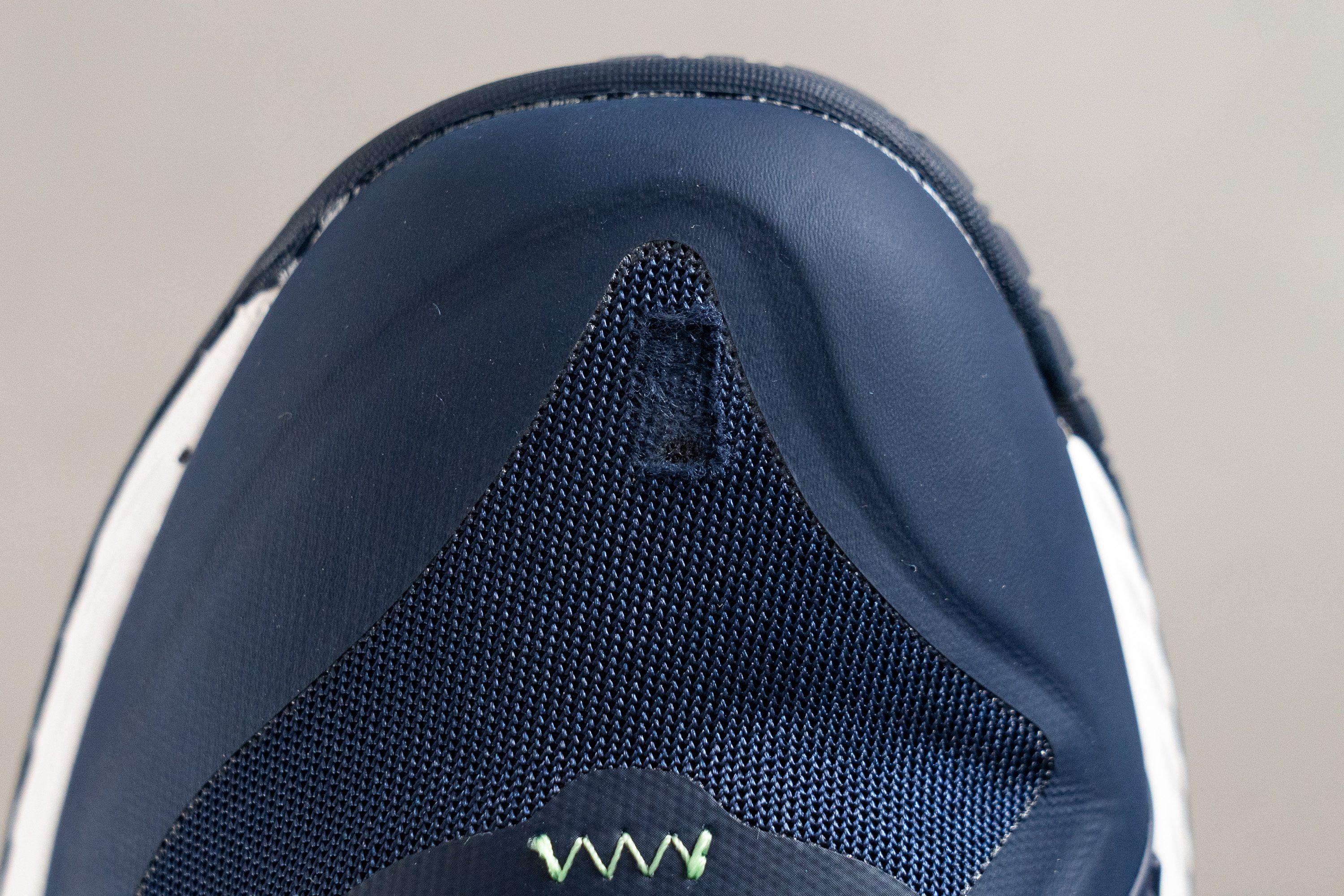
Considering that we were drilling raw and unprotected fabric of the 796 v5, the result was stunning! We rated the shoe's toebox durability with a moderate score of 3 out of 5. But there is no doubt about it - this shoe's upper will tear down faster than others.
We also don't expect this NB shoe to survive repeated toe drags for long. The guard on its medial side is way too slender.
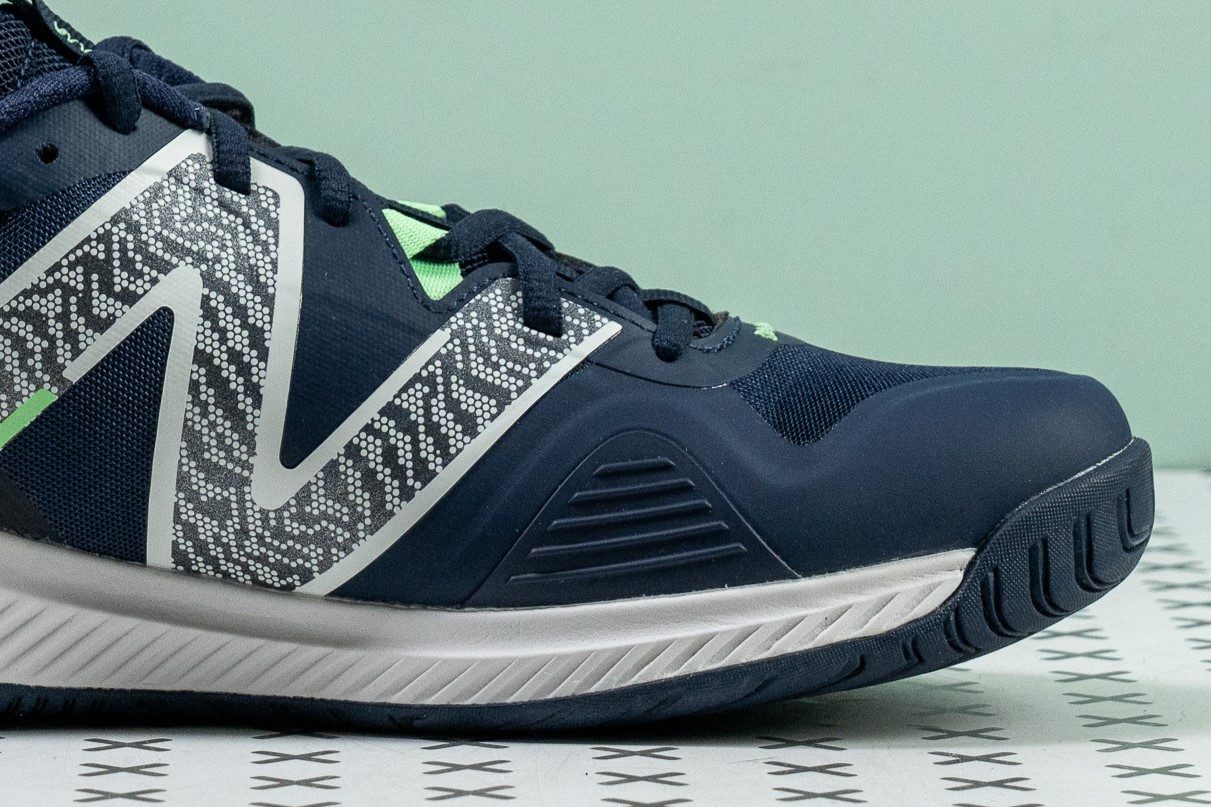
Let's take a moment of silence to appreciate the medial protection on the £160 pair of the Adidas Barricade 13.
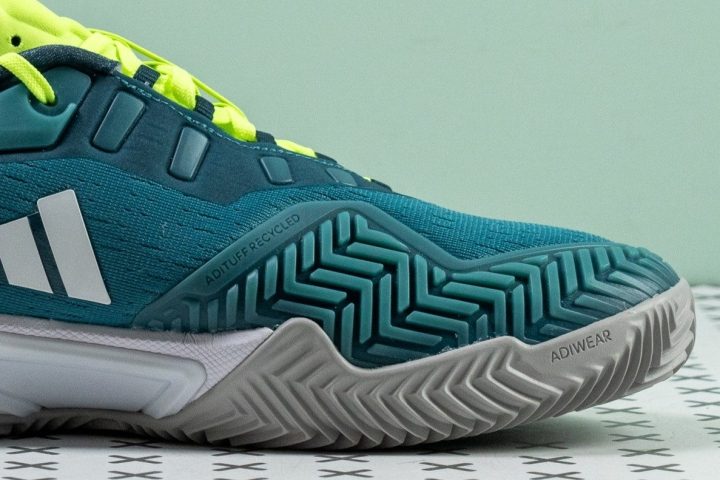
| 796 v3 | 3 |
| Average | 3.7 |
Heel padding durability
What caught us off guard, however, was the abrasion resistance of this shoe's inner lining! We haven't seen such durability even on some of the more expensive models!
After 4 seconds of drilling the inner side of the heel collar, this NB shoe showed admirable resistance. The sandpaper barely even scratched its surface! At this price point, the 796 v5 gets an instant 5 out of 5 for the heel padding durability.
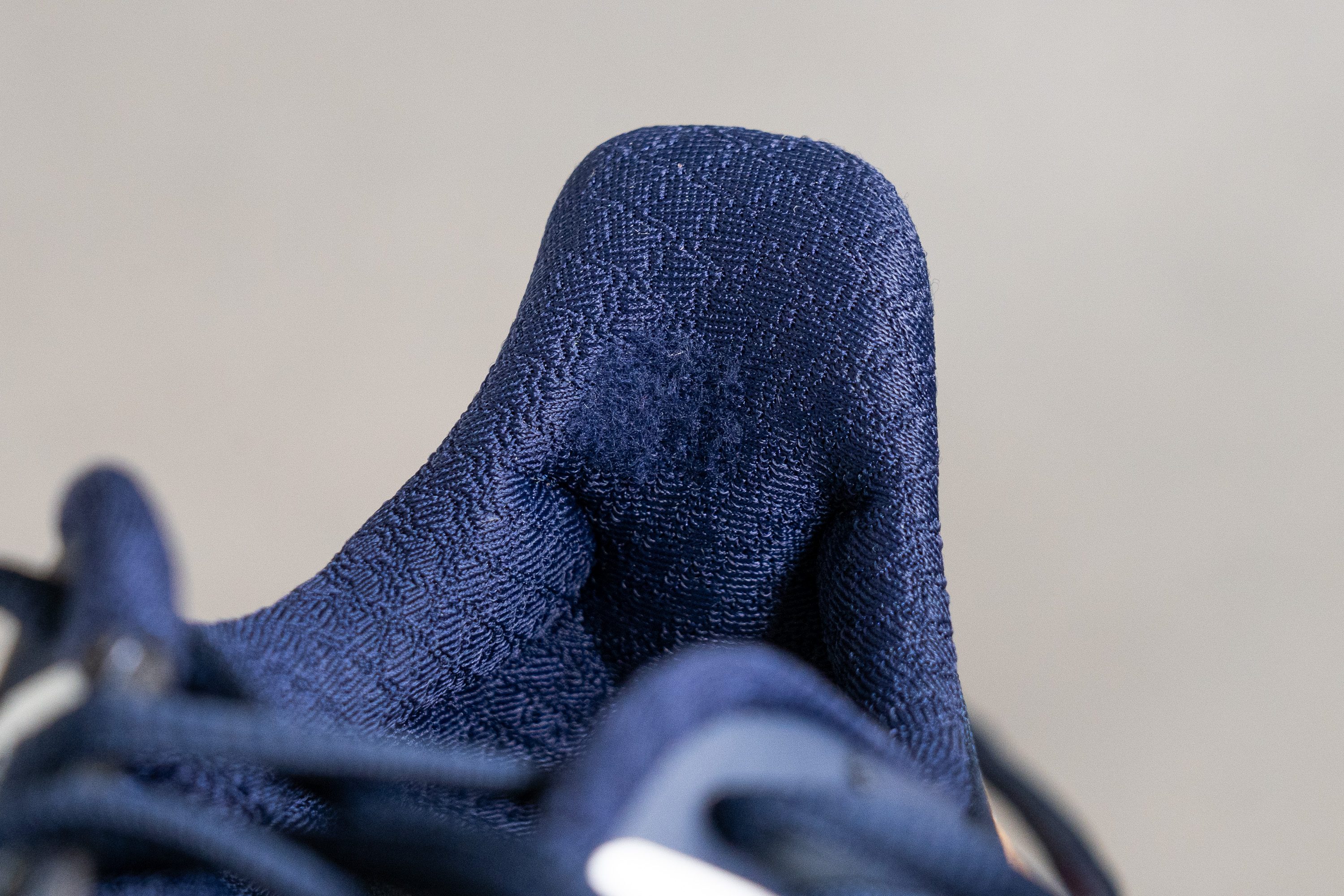
| 796 v3 | 5 |
| Average | 3.3 |
Outsole hardness
From here on, it only gets better... New Balance is not messing with durability, even in its more affordable range of footwear.
To begin with, we were struck by the unusually high durometer reading of the rubber. At 90.0 HC, it is among the hardest in our tennis shoe roster! That is normally the first sign of outsole longevity.
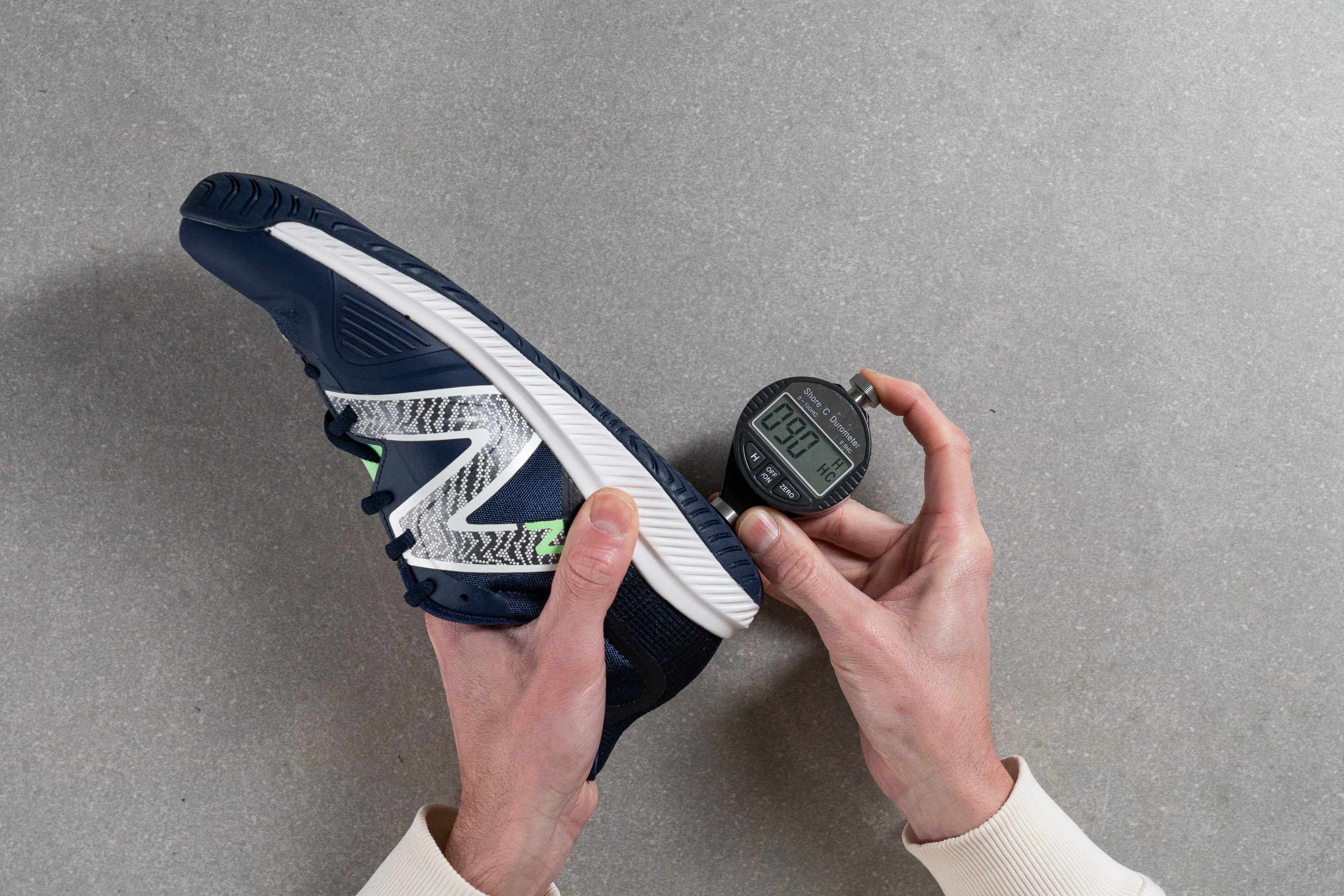
| 796 v3 | 90.0 HC |
| Average | 86.0 HC |
Outsole durability
No matter how much the shoe costs, our Dremel doesn't offer any discounts on our durability standards. This time around, the speed was set to the relentless 10K RPM, and the time of drilling was extended to 22 seconds.
And the New Balance 796 v5 showed amazing results yet again! Measuring the dent with a tread gauge, we couldn't believe that it was only 0.6 mm deep! Even the more expensive tennis shoes ended up with greater damage!
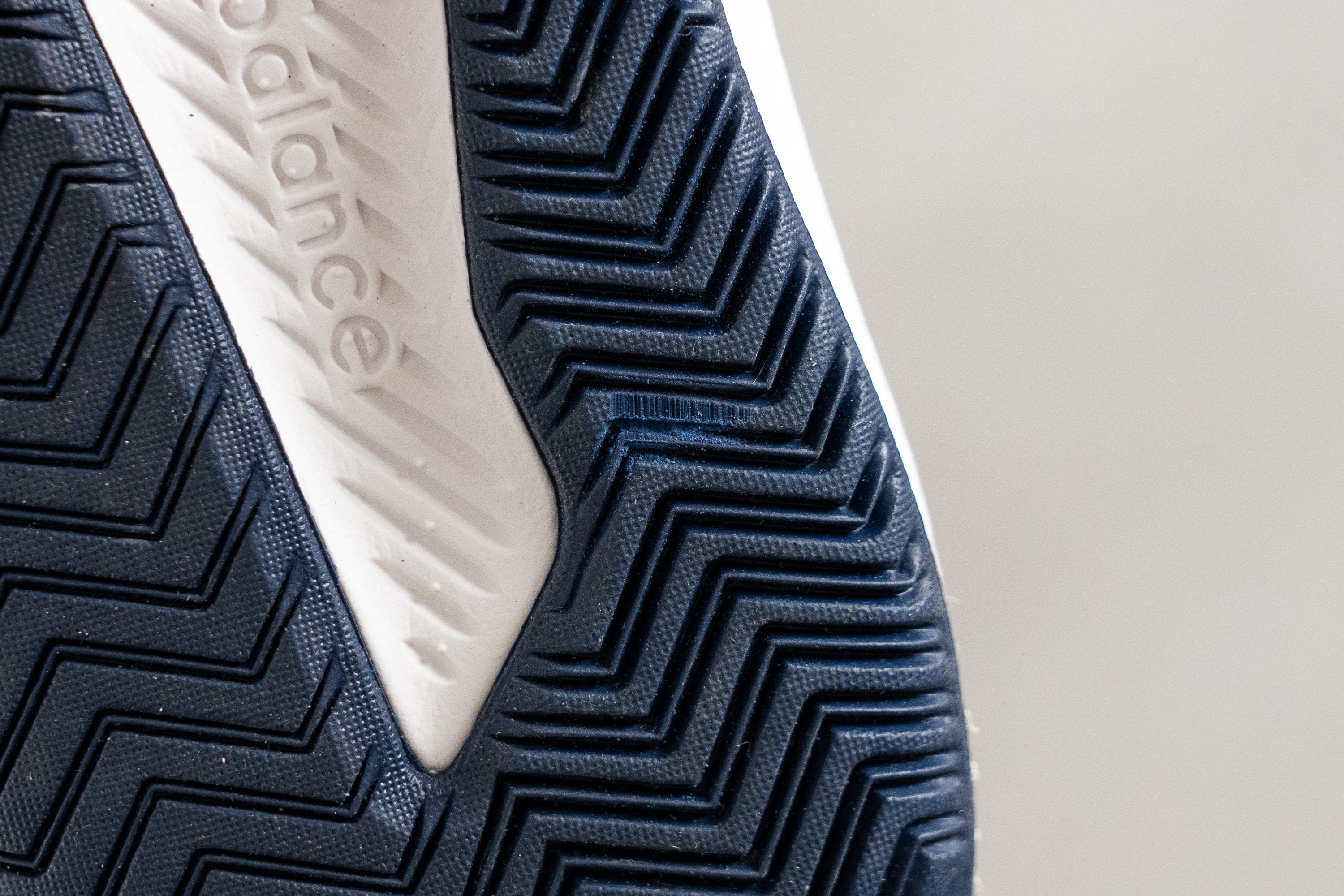
| 796 v3 | 0.6 mm |
| Average | 0.7 mm |
Outsole thickness
Now mix that with the shoe's impressive outsole thickness of 4.5 mm! That's a truly big chunk of rubber for a simple shoe like the 796 v5.
We believe that after months of use, when the shoe's upper is all torn apart and the midsole feels like a pancake, the rubber outsole will still be standing strong, just like new!
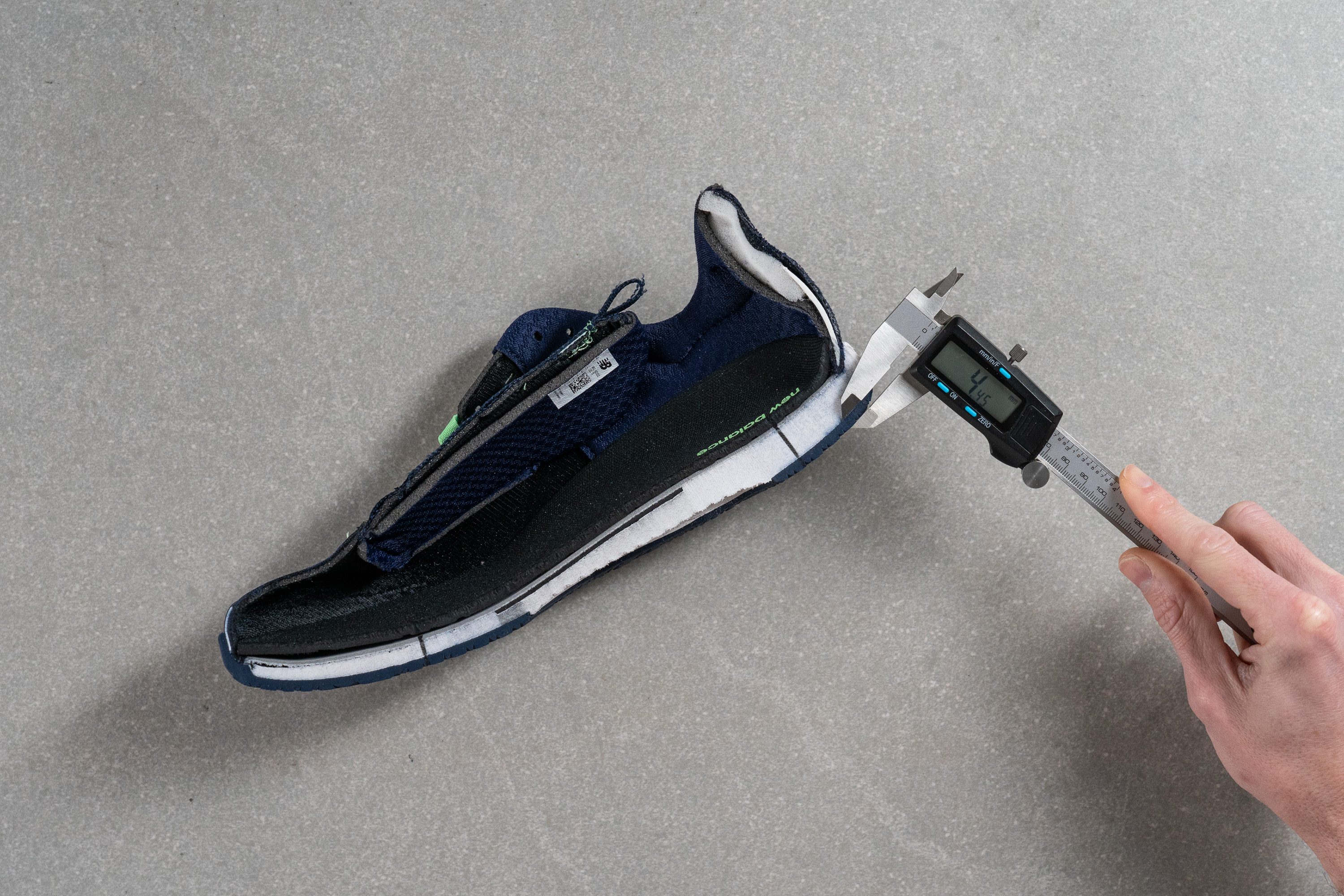
| 796 v3 | 4.5 mm |
| Average | 4.2 mm |
Misc
Insole thickness
The shoe's insole is not particularly padded either. WIth a thickness of only 3.9 mm, it runs on the thinner side of tennis shoe insoles.
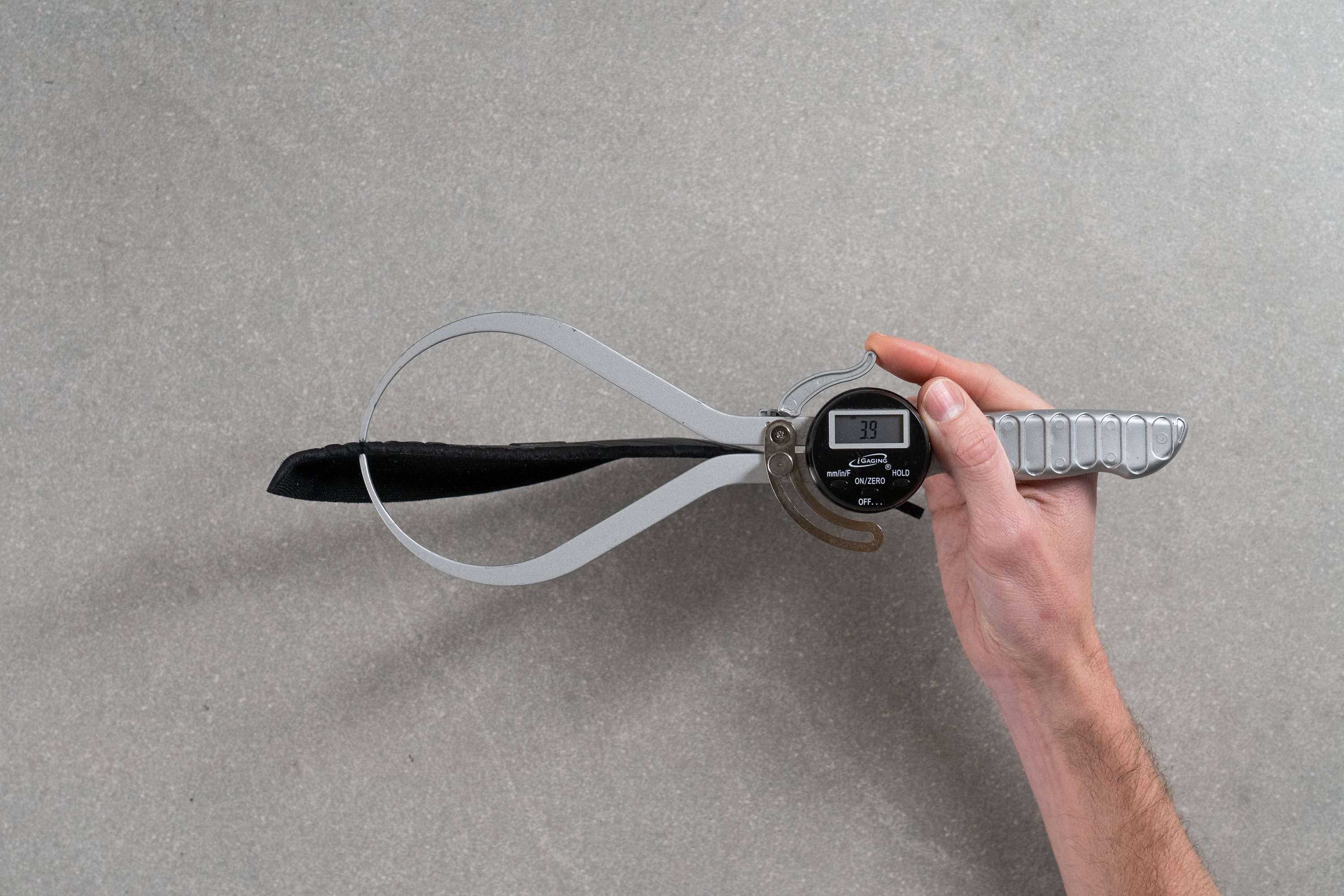
| 796 v3 | 3.9 mm |
| Average | 5.1 mm |
Removable insole
You can make this New Balance shoe feel less cheap by swapping its stock insole with an aftermarket one easily.
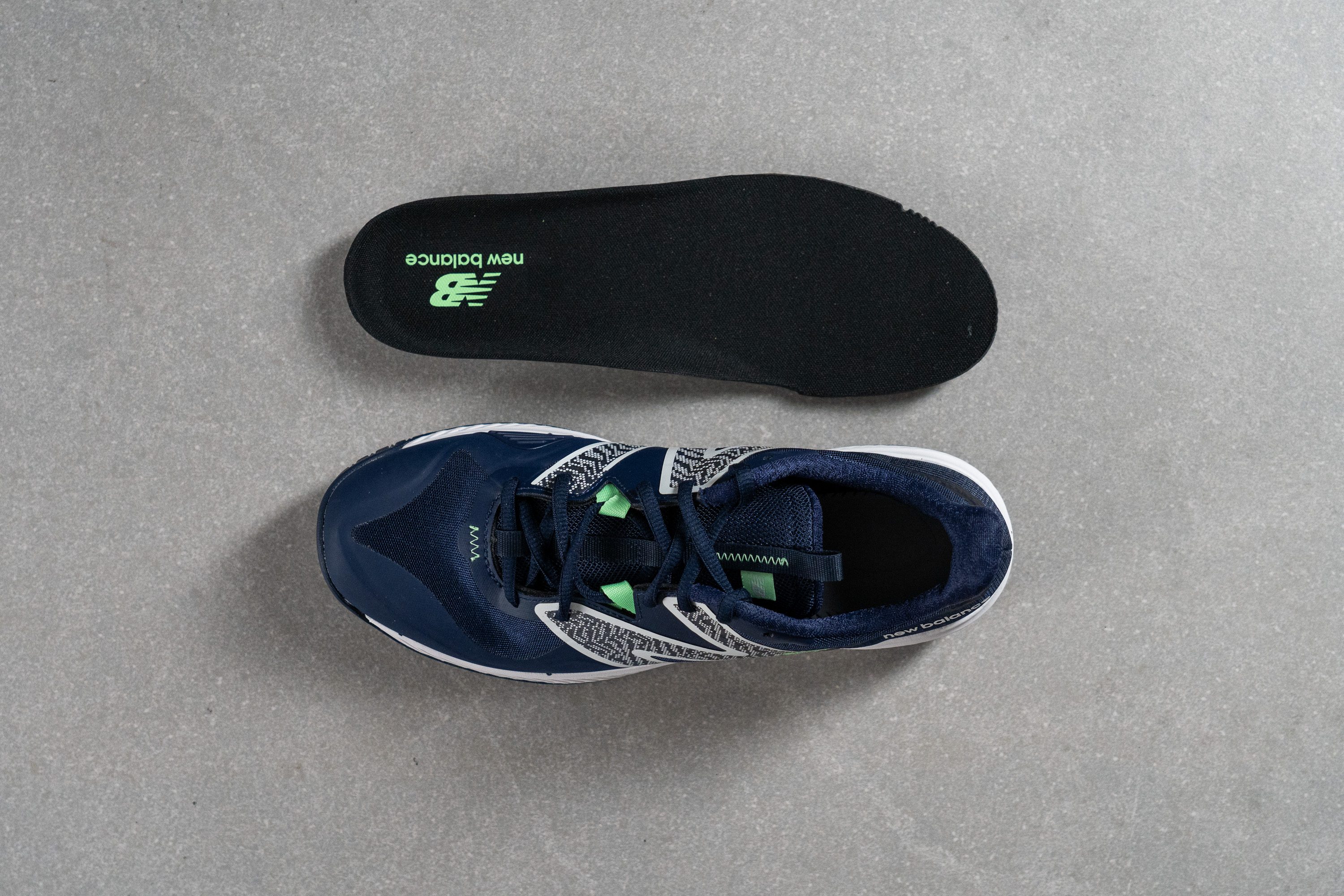
| 796 v3 | Yes |
Tongue padding
One thing that's not missing in this New Balance tennis shoe is the interior padding.
We found it to be sufficient in both the collar and the tongue. Measuring its thickness in the tongue returned 7.9 mm on our calliper. Just the same as in the other tennis shoes.
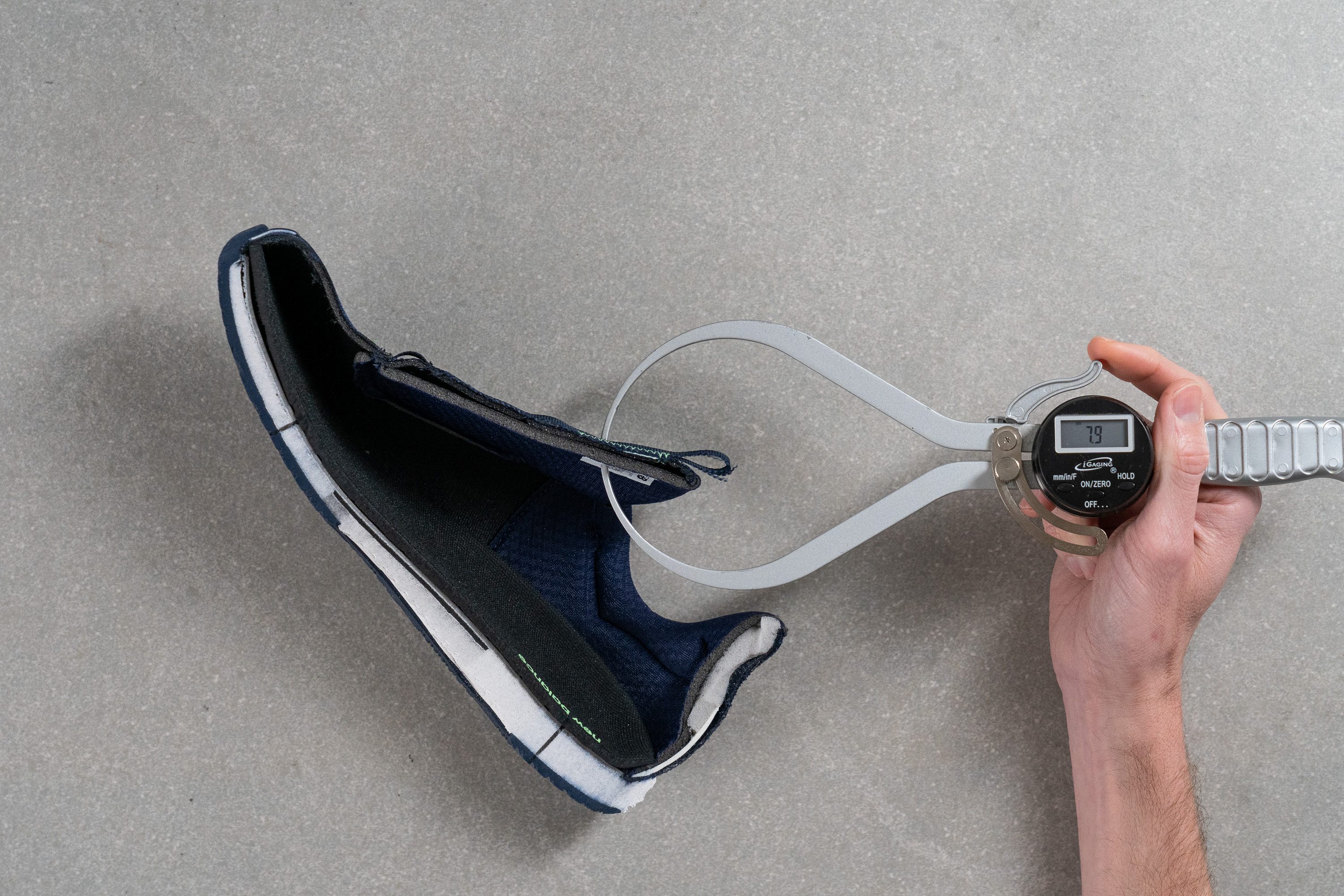
| 796 v3 | 7.9 mm |
| Average | 8.2 mm |
Tongue: gusset type
As a budget-oriented shoe, no gussets are to be found in the NB 796 v5.
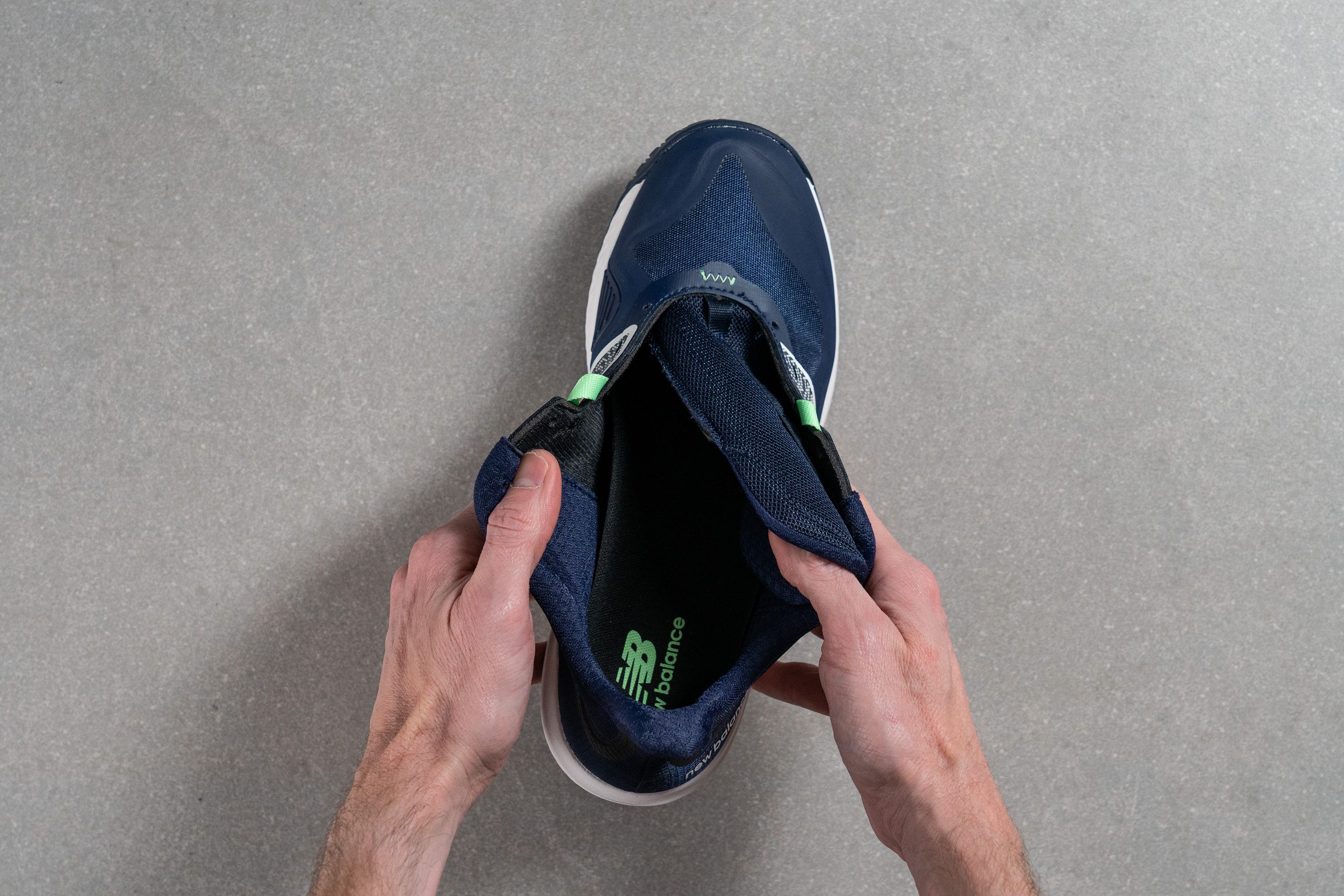
| 796 v3 | None |
Heel tab
With the extended elf-like collar, New Balance through that adding a pull tab was not necessary. And we can actually agree with that.
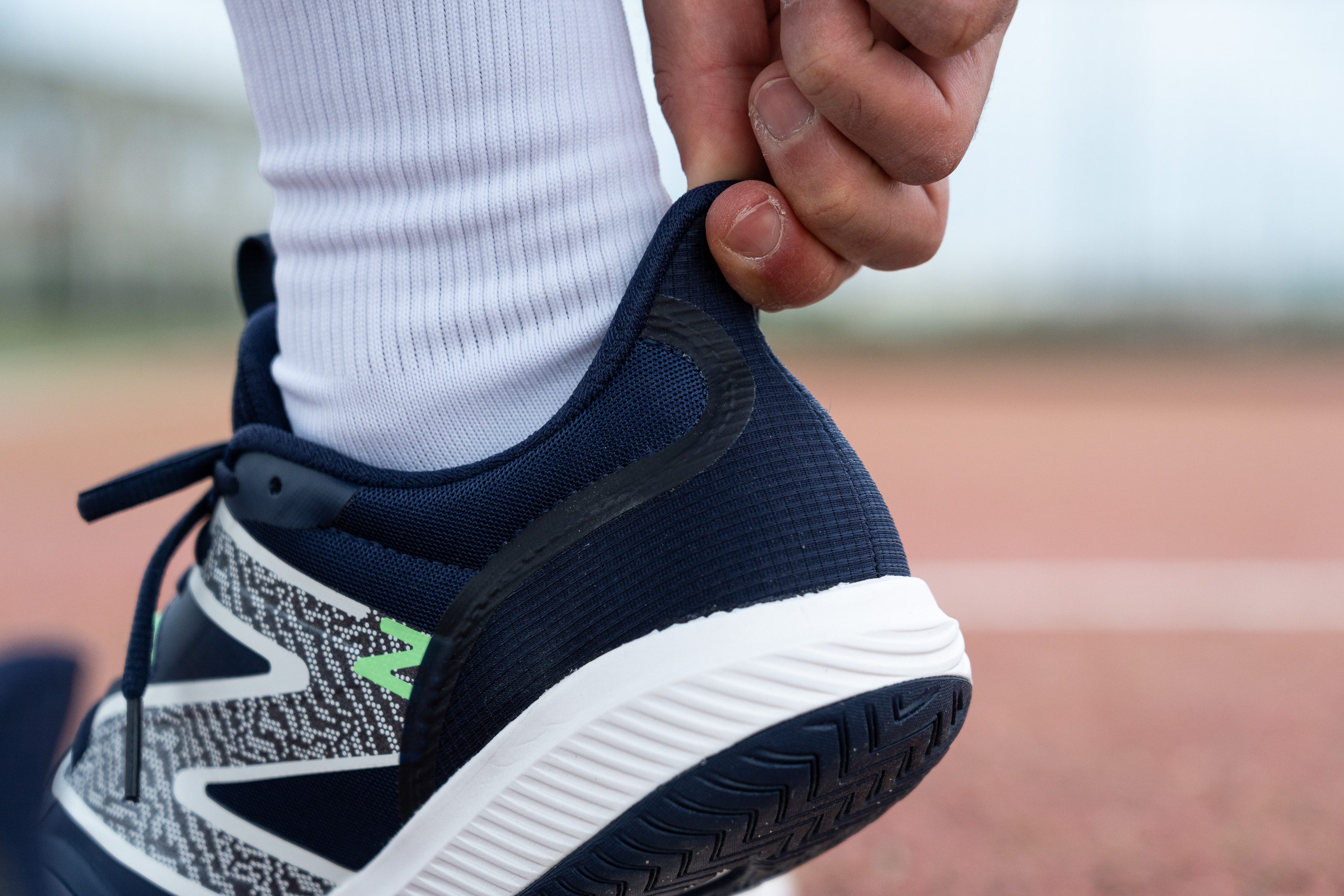
| 796 v3 | None |

